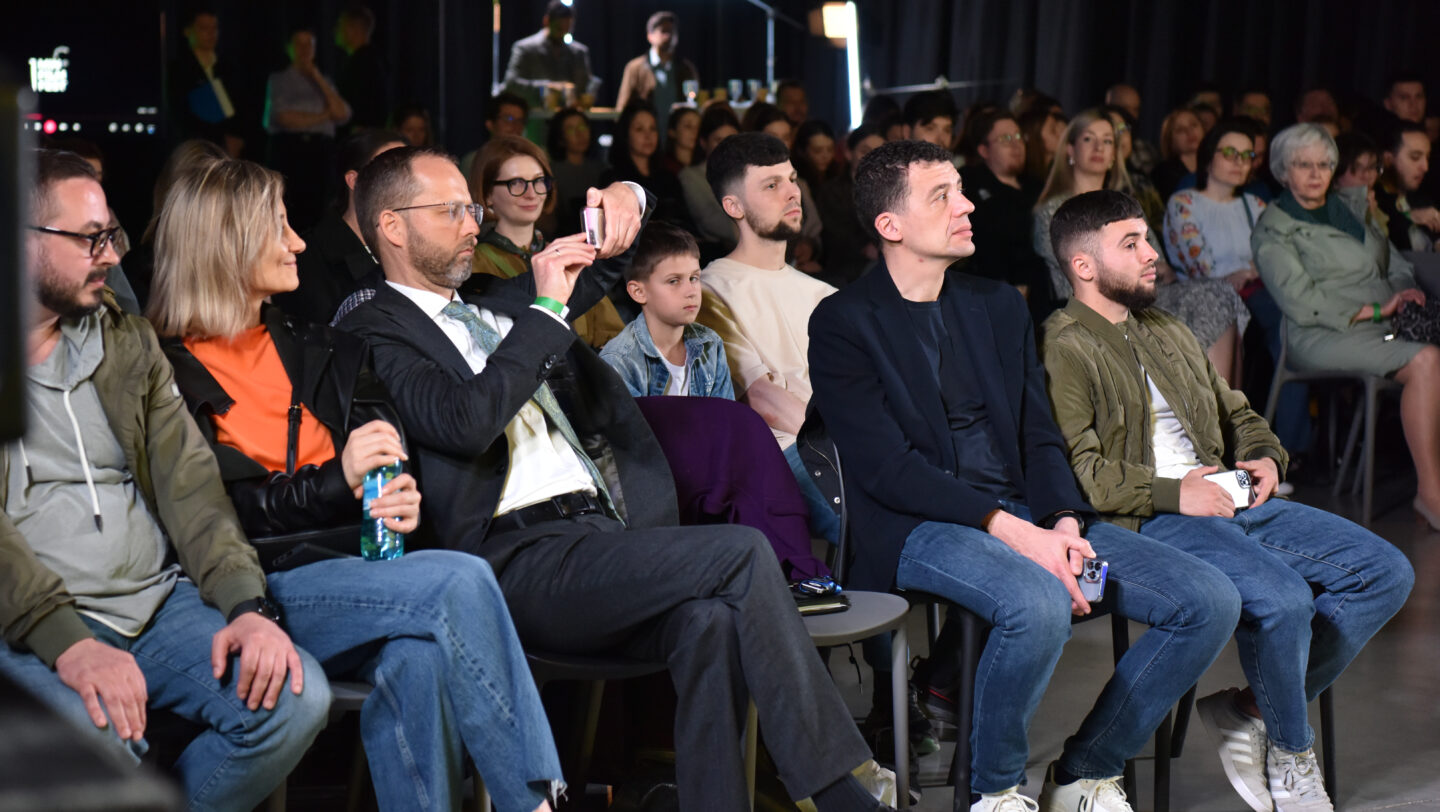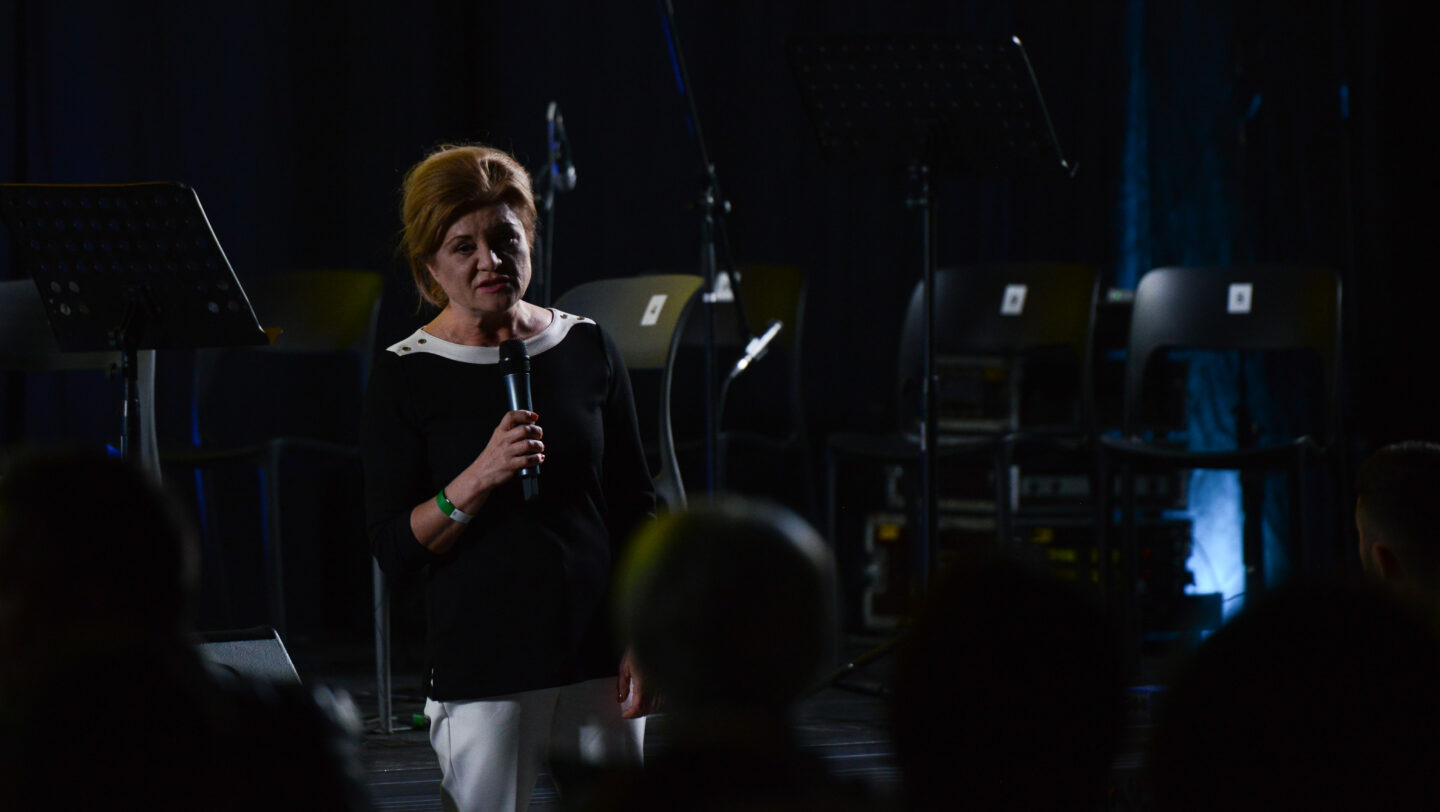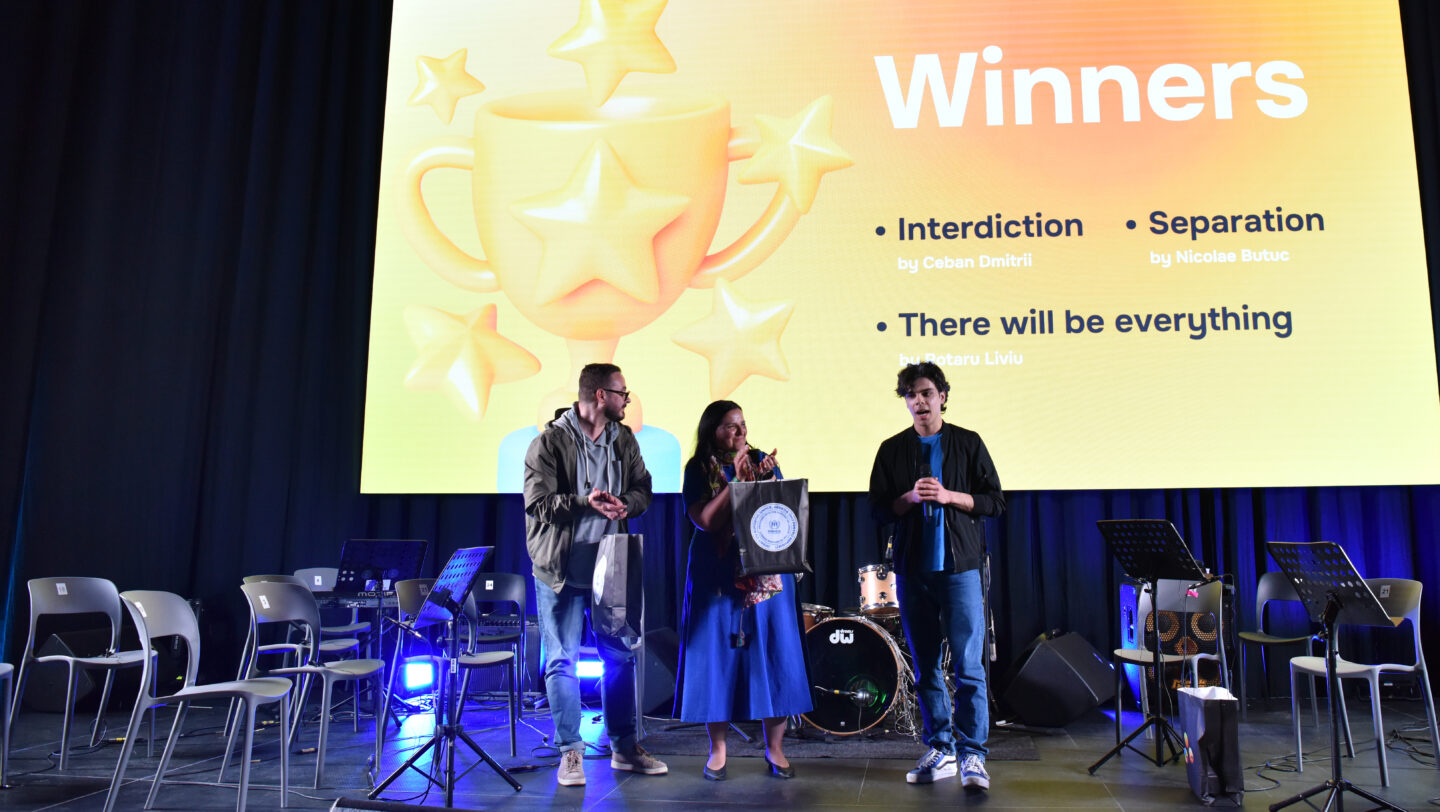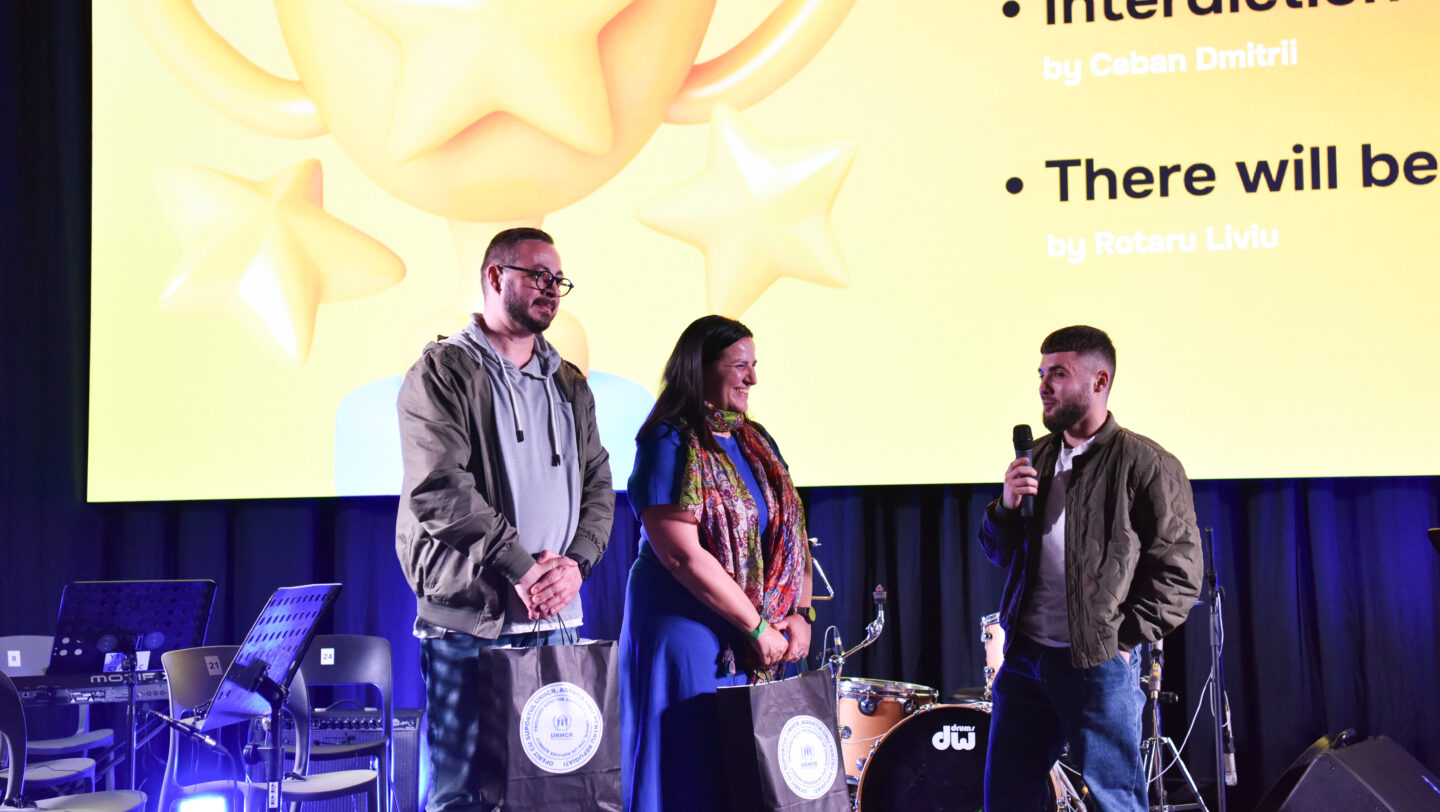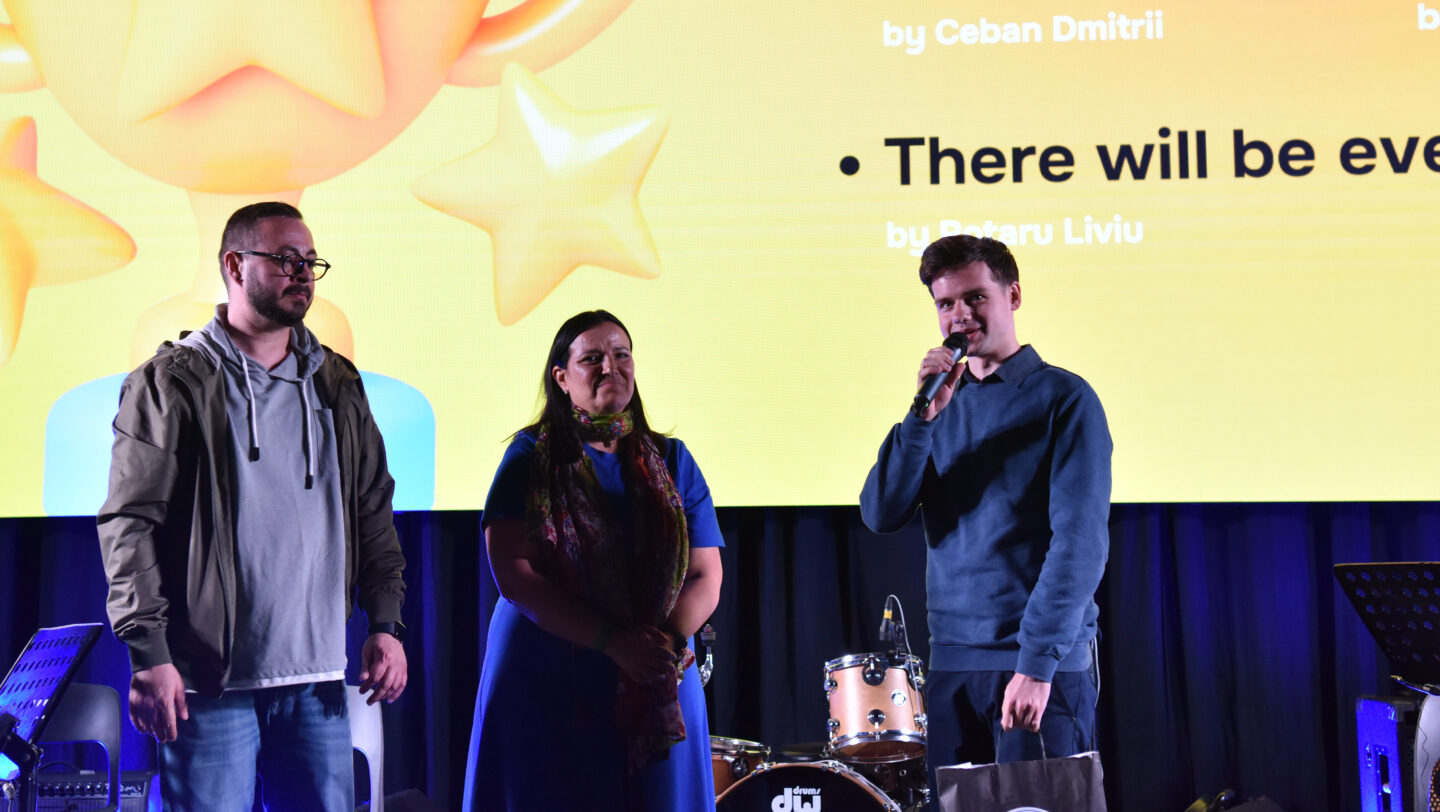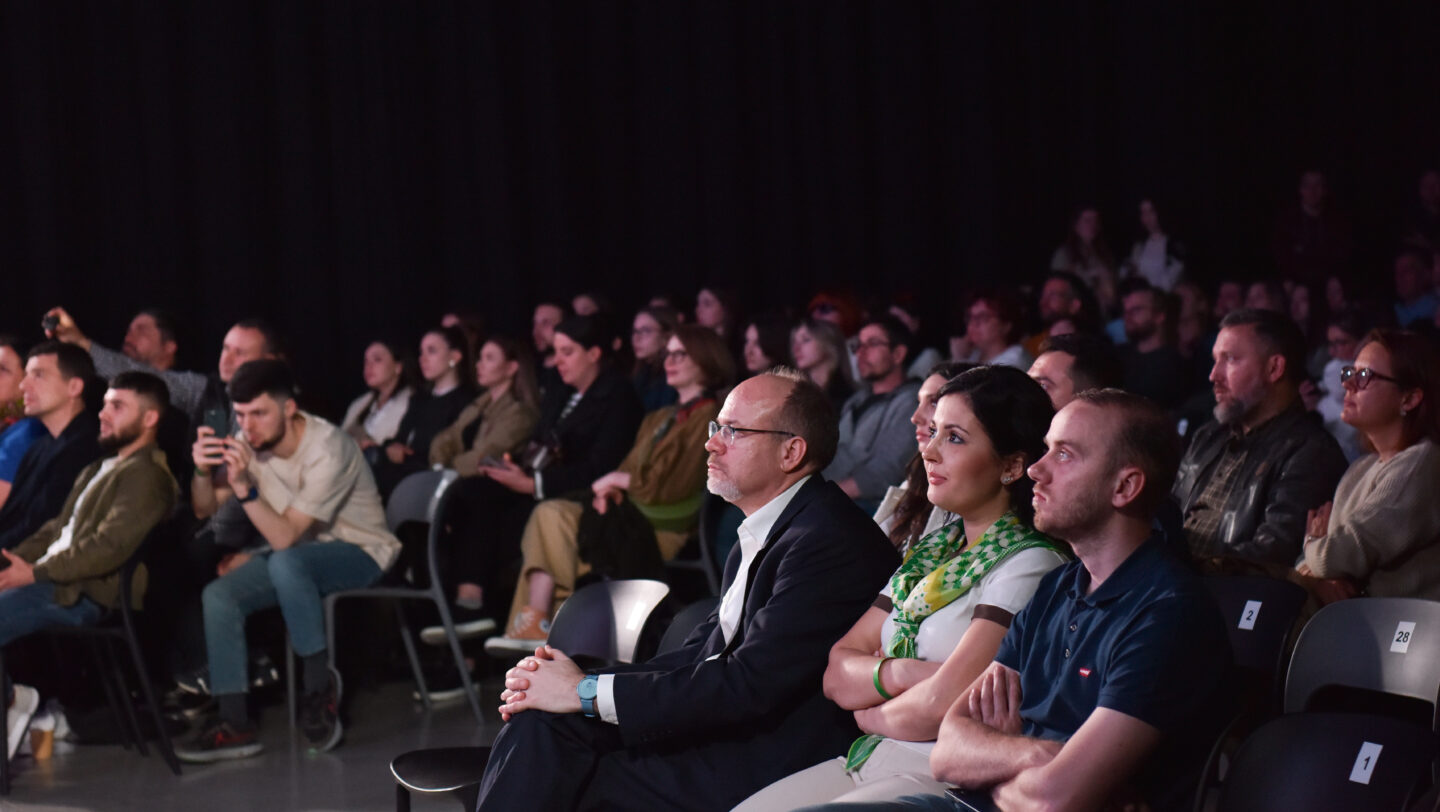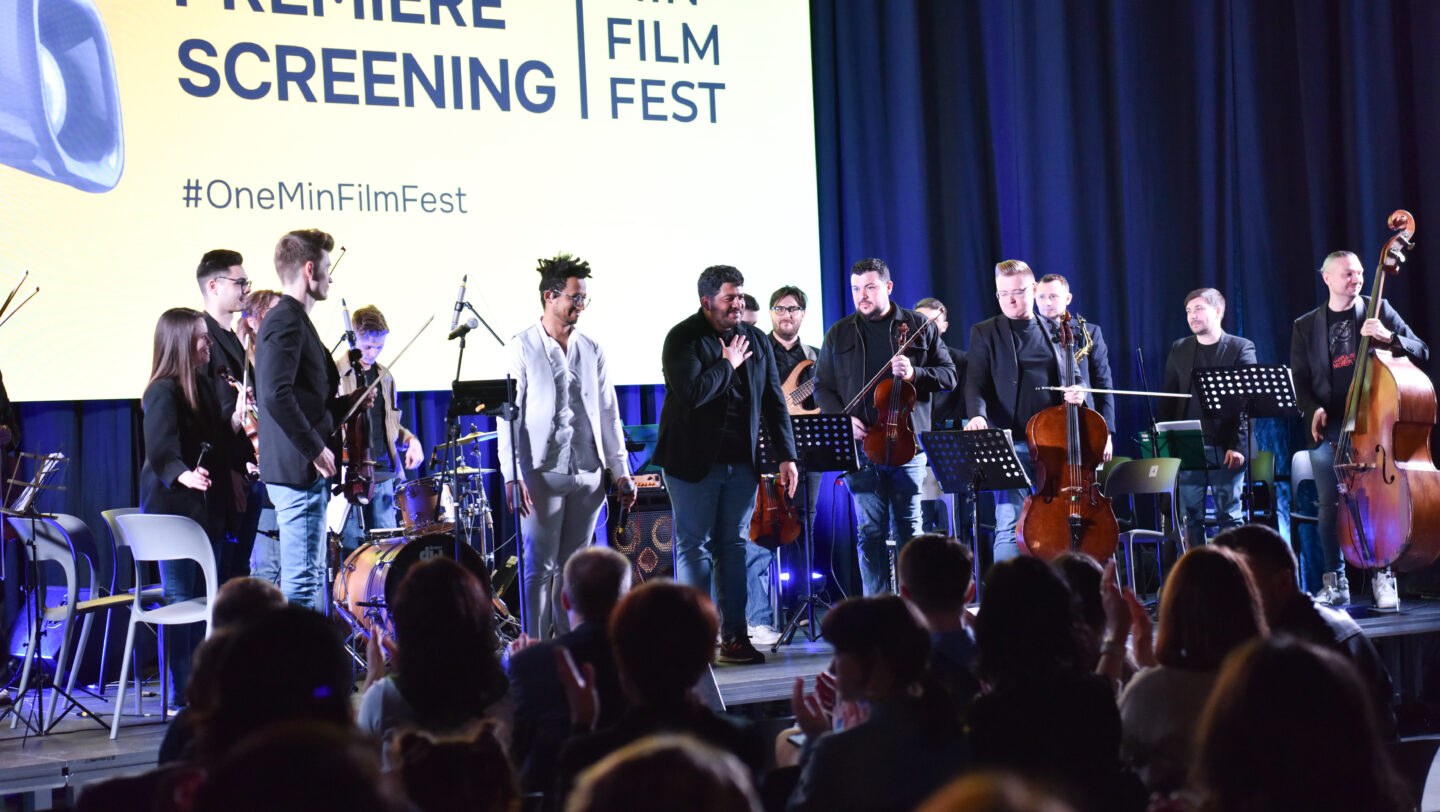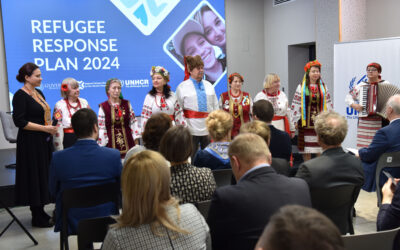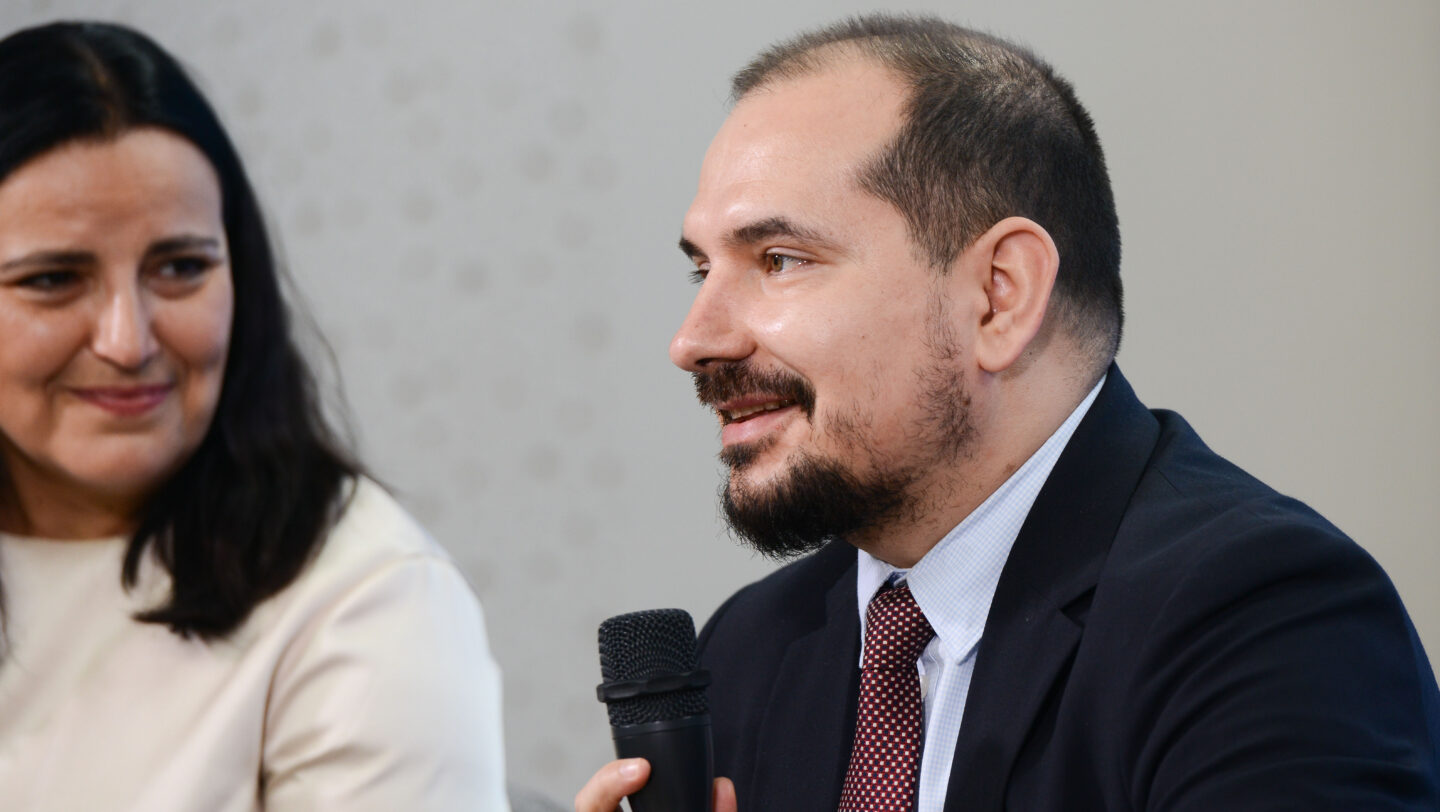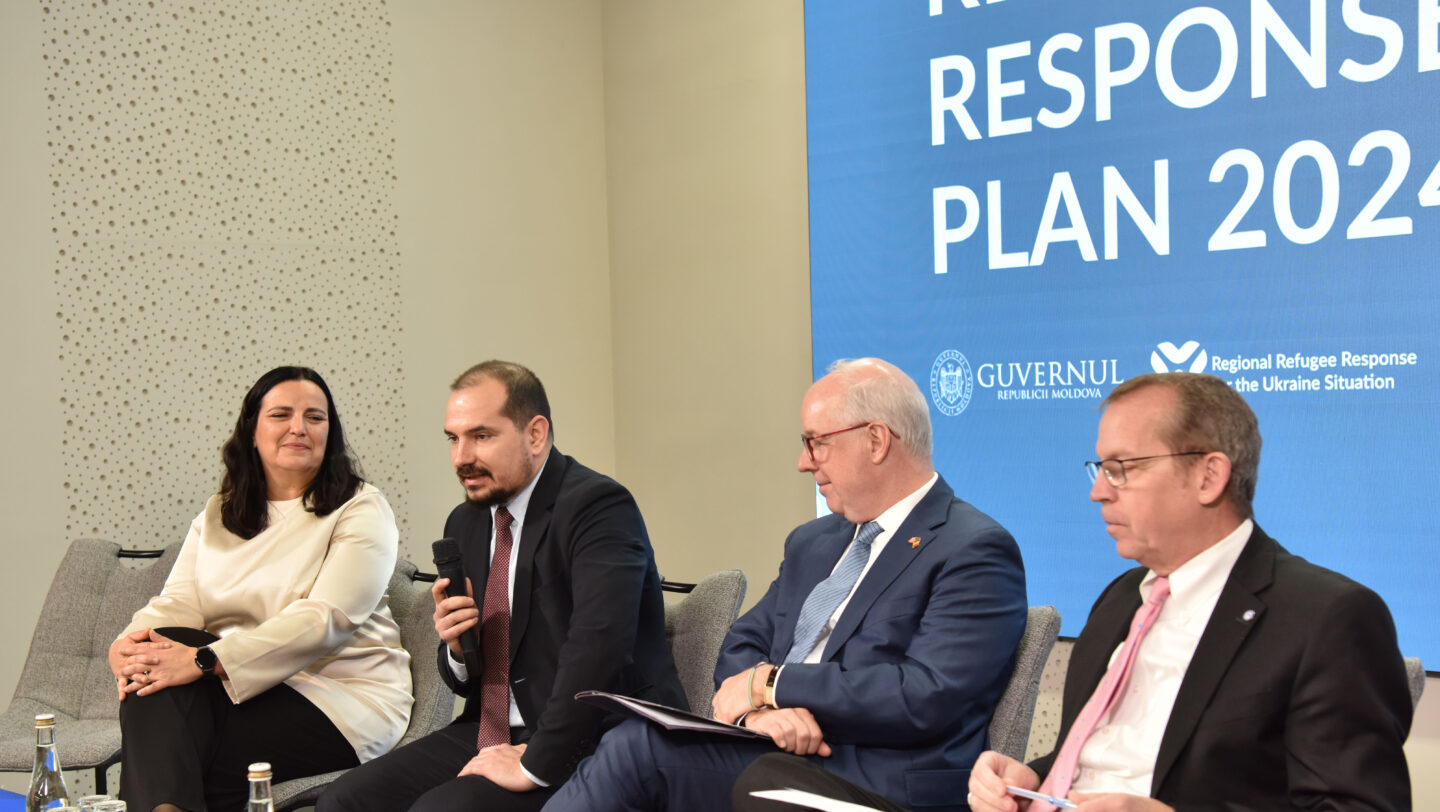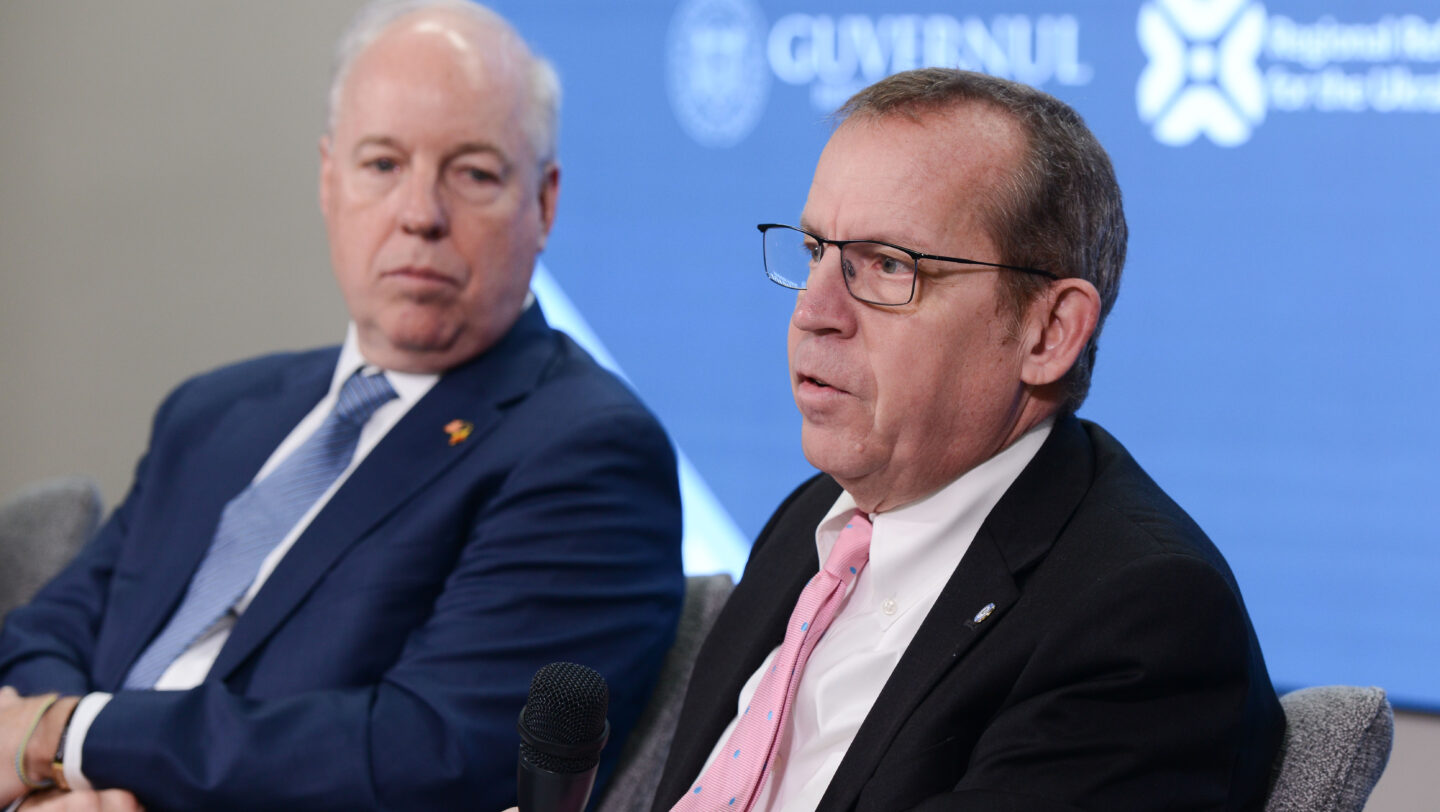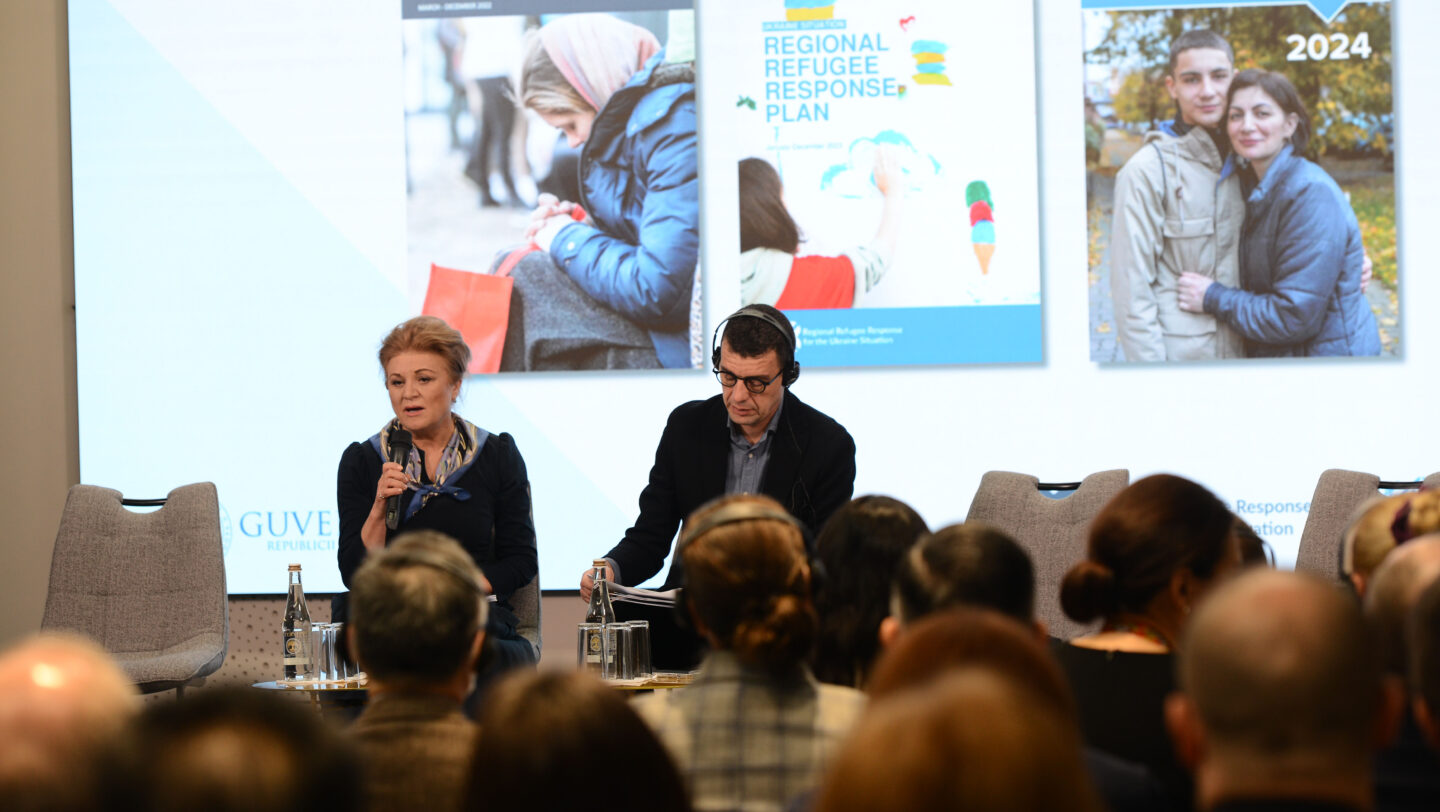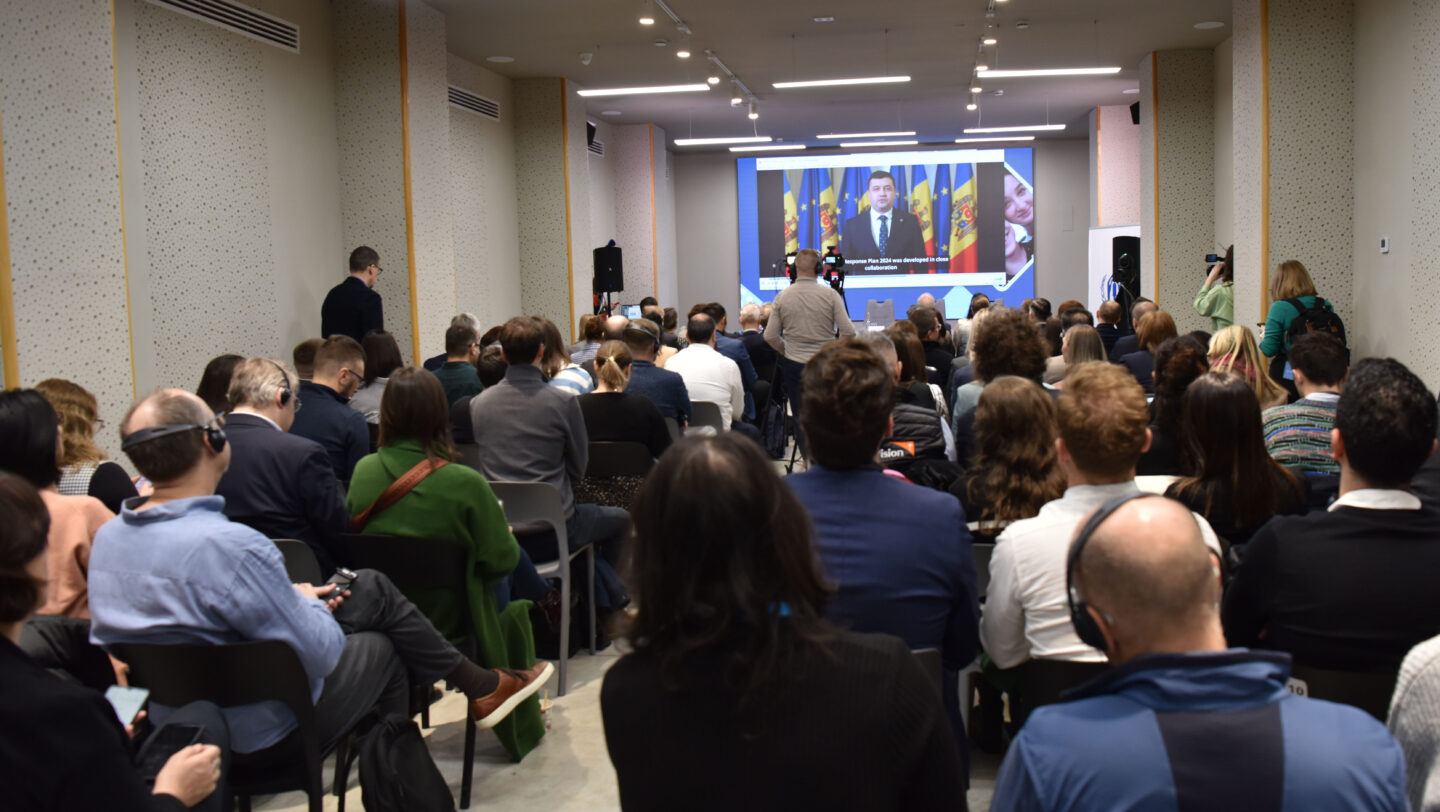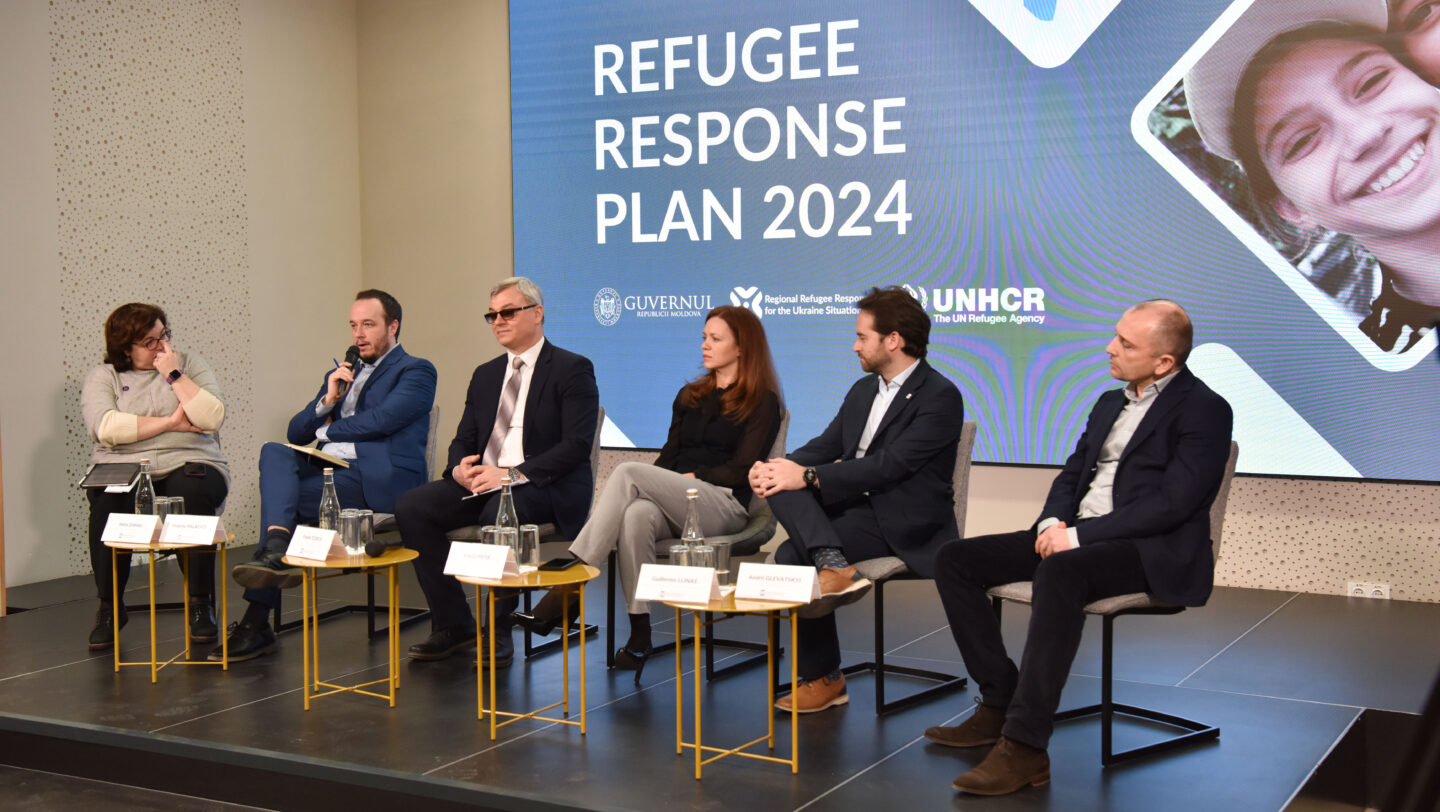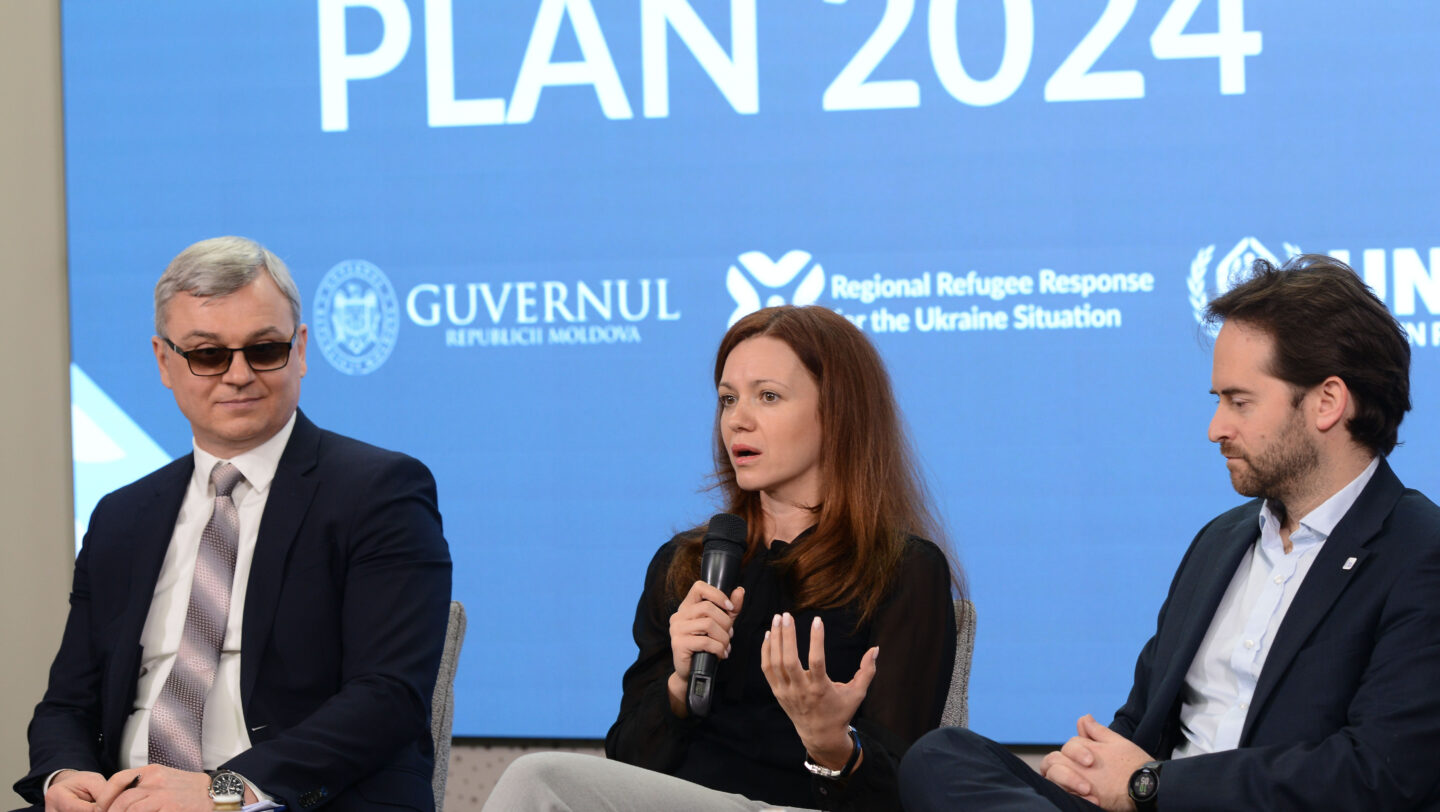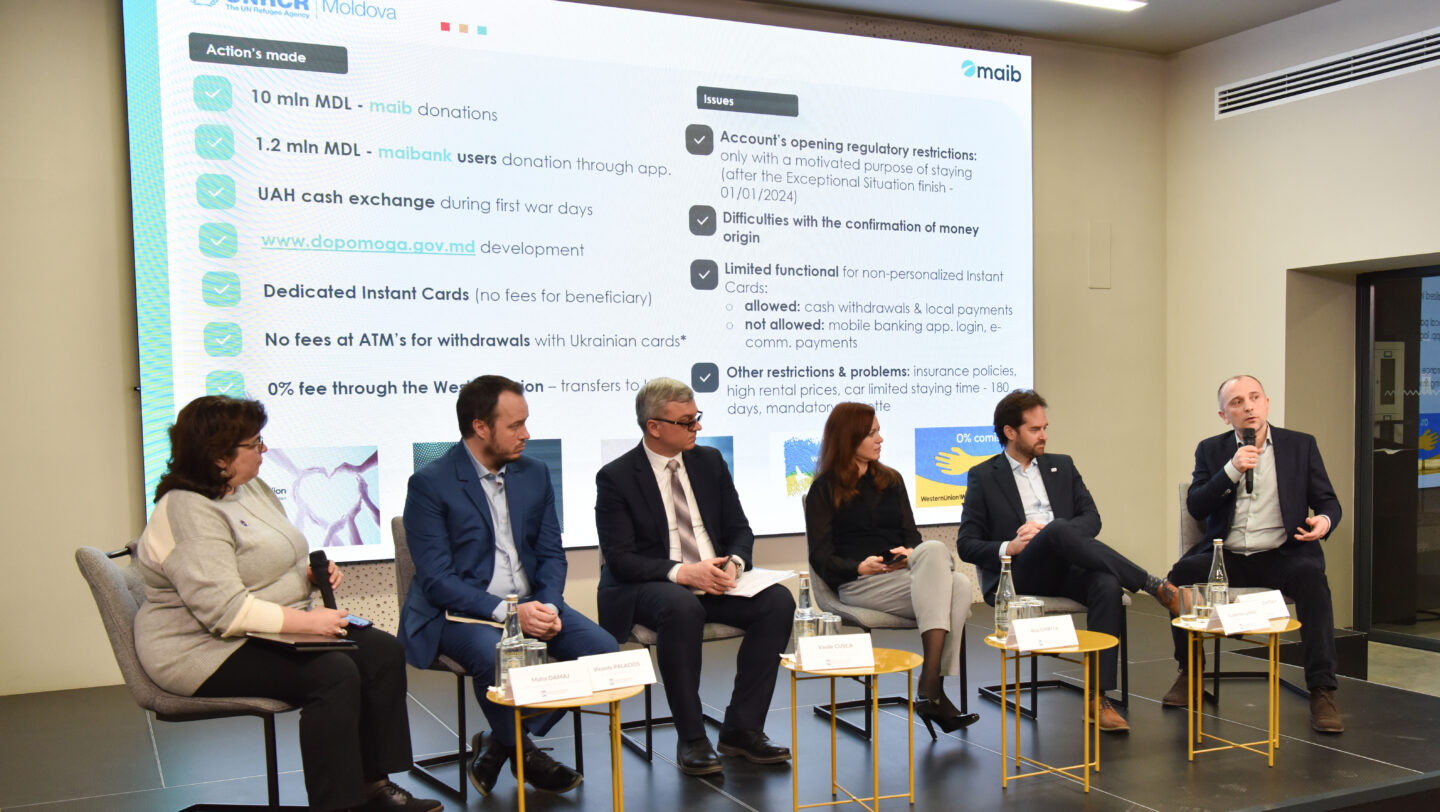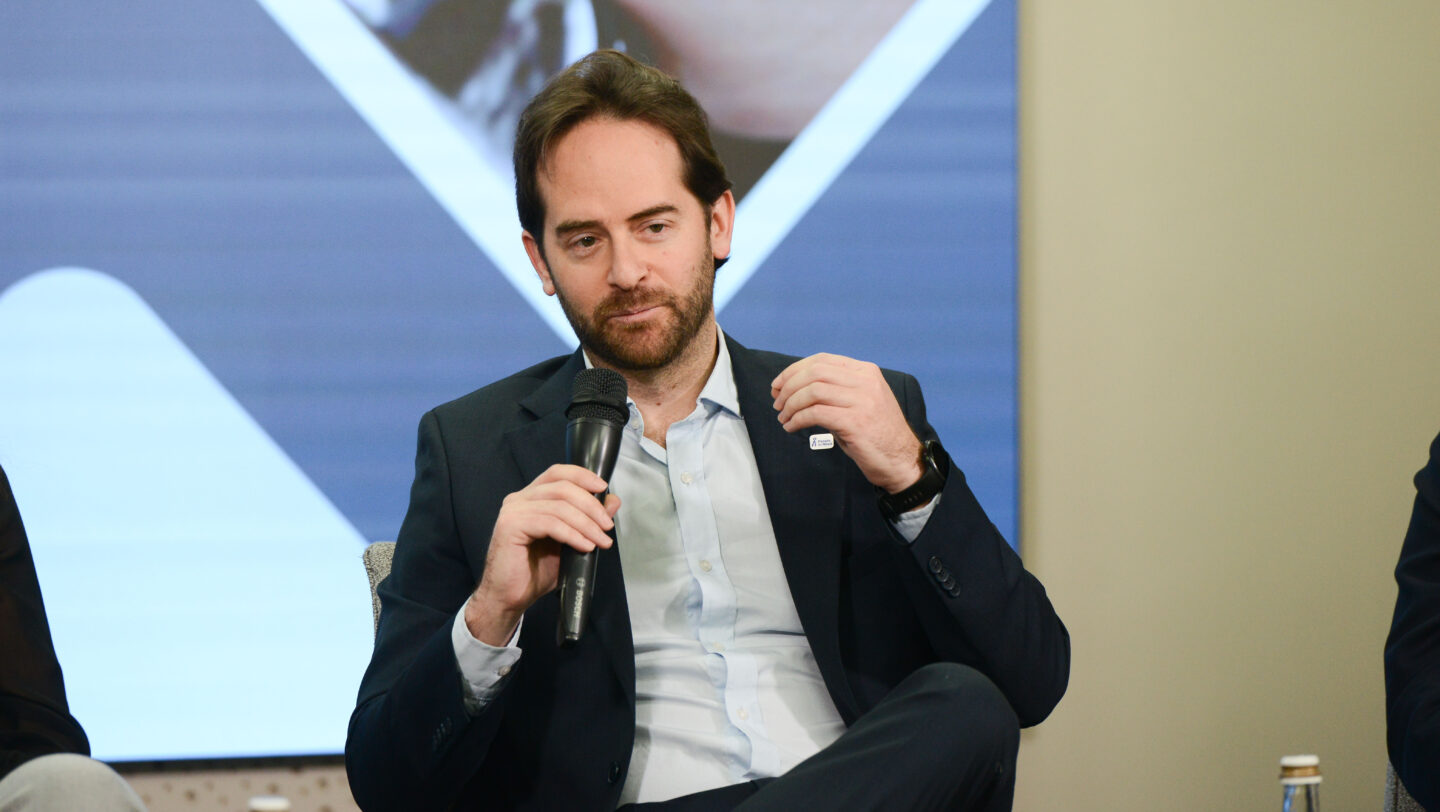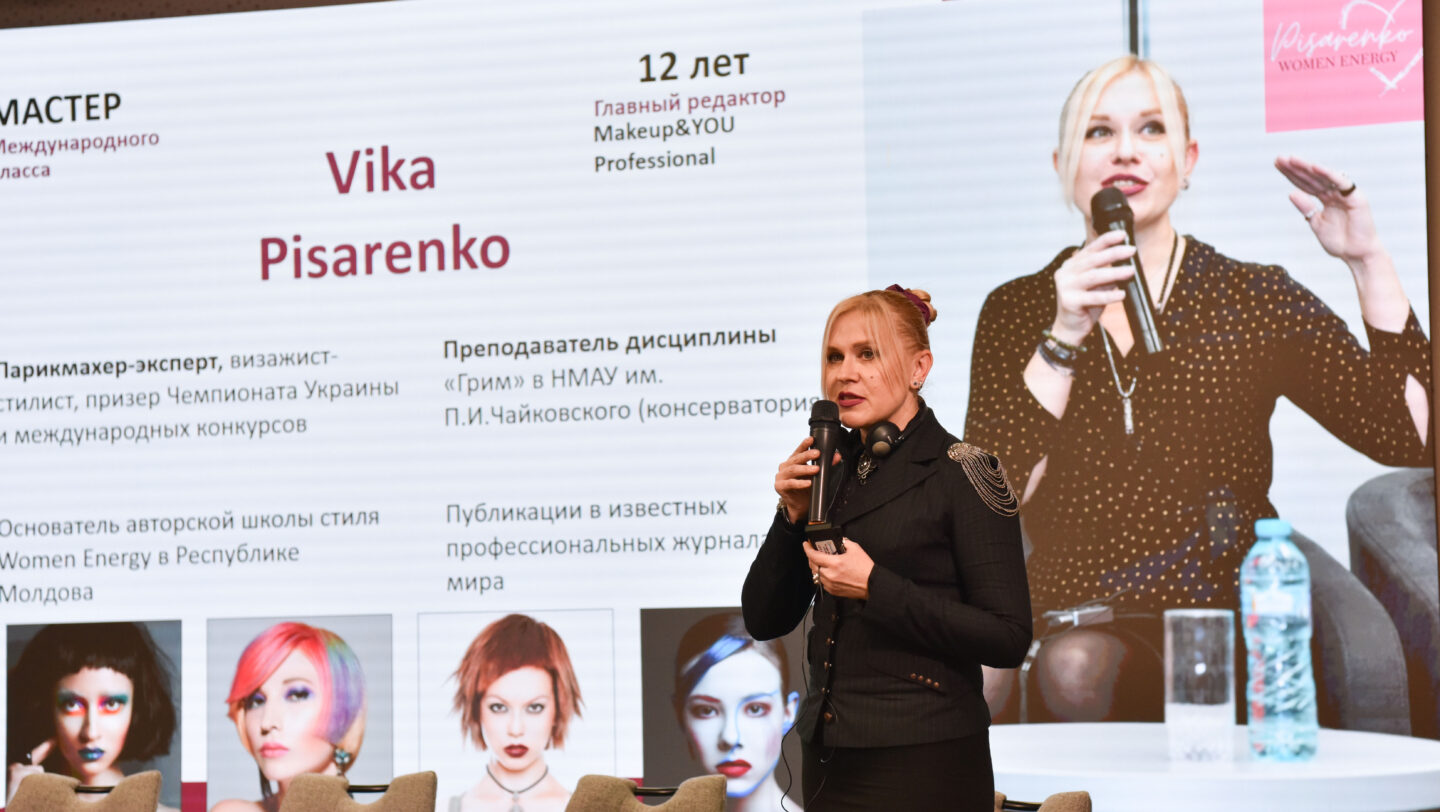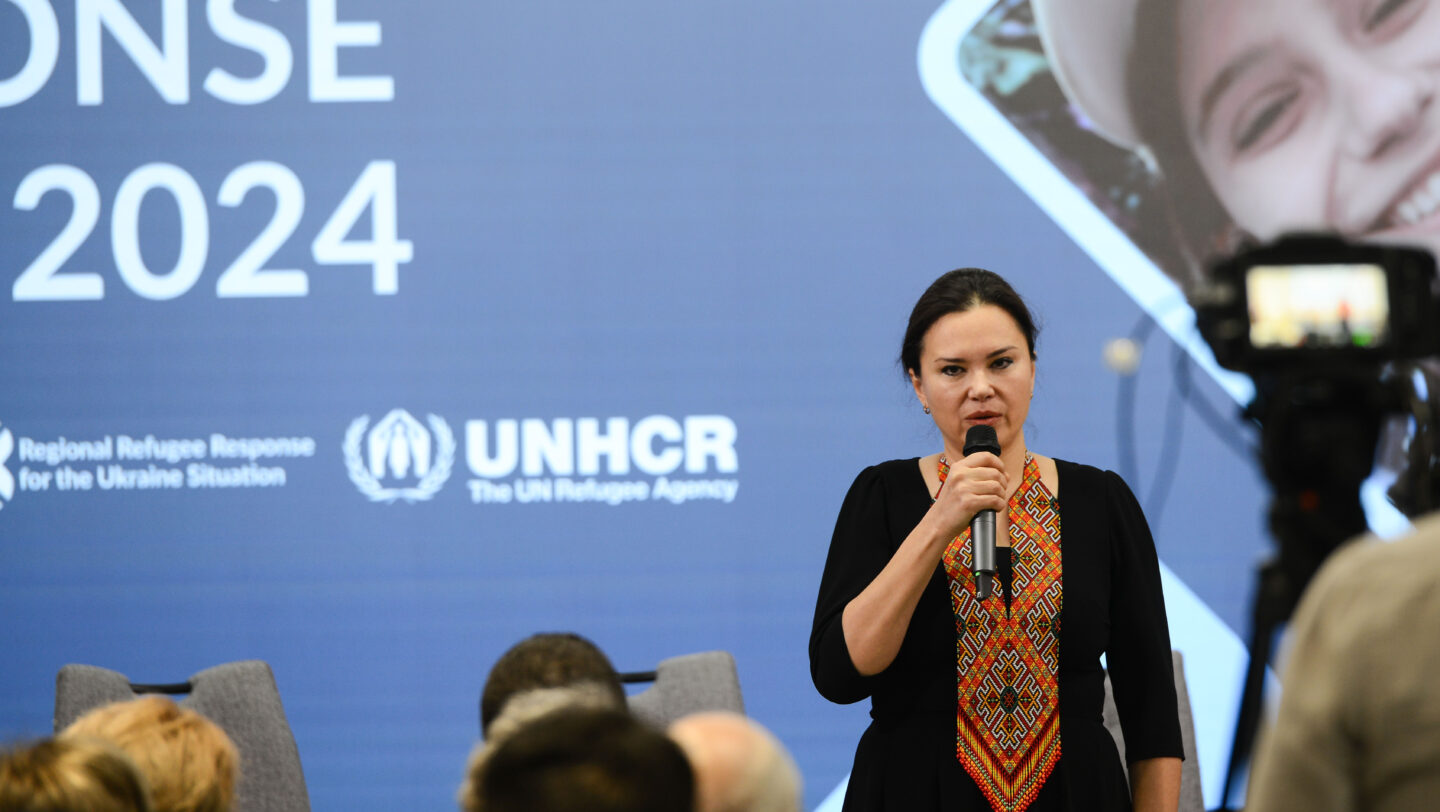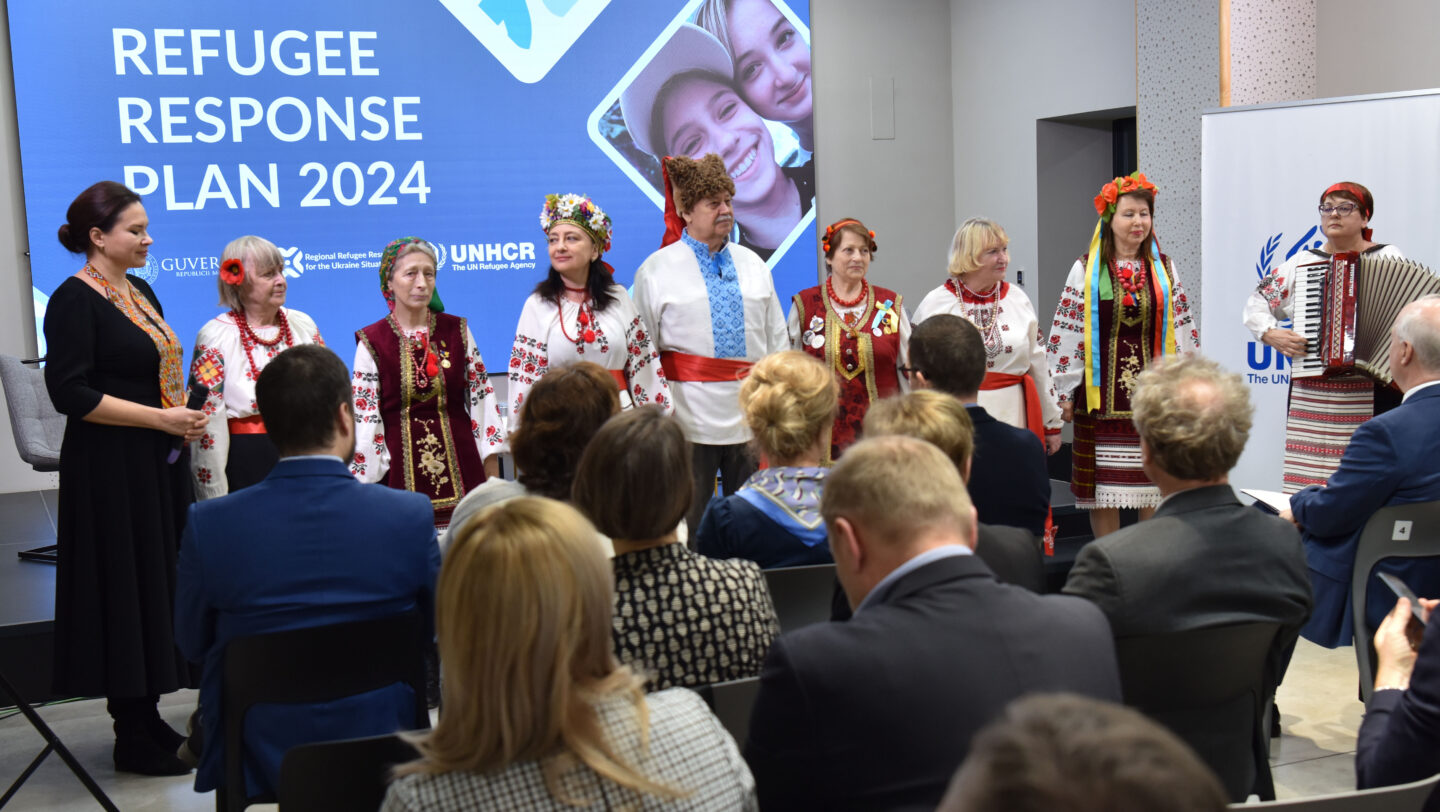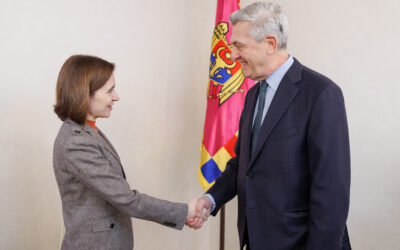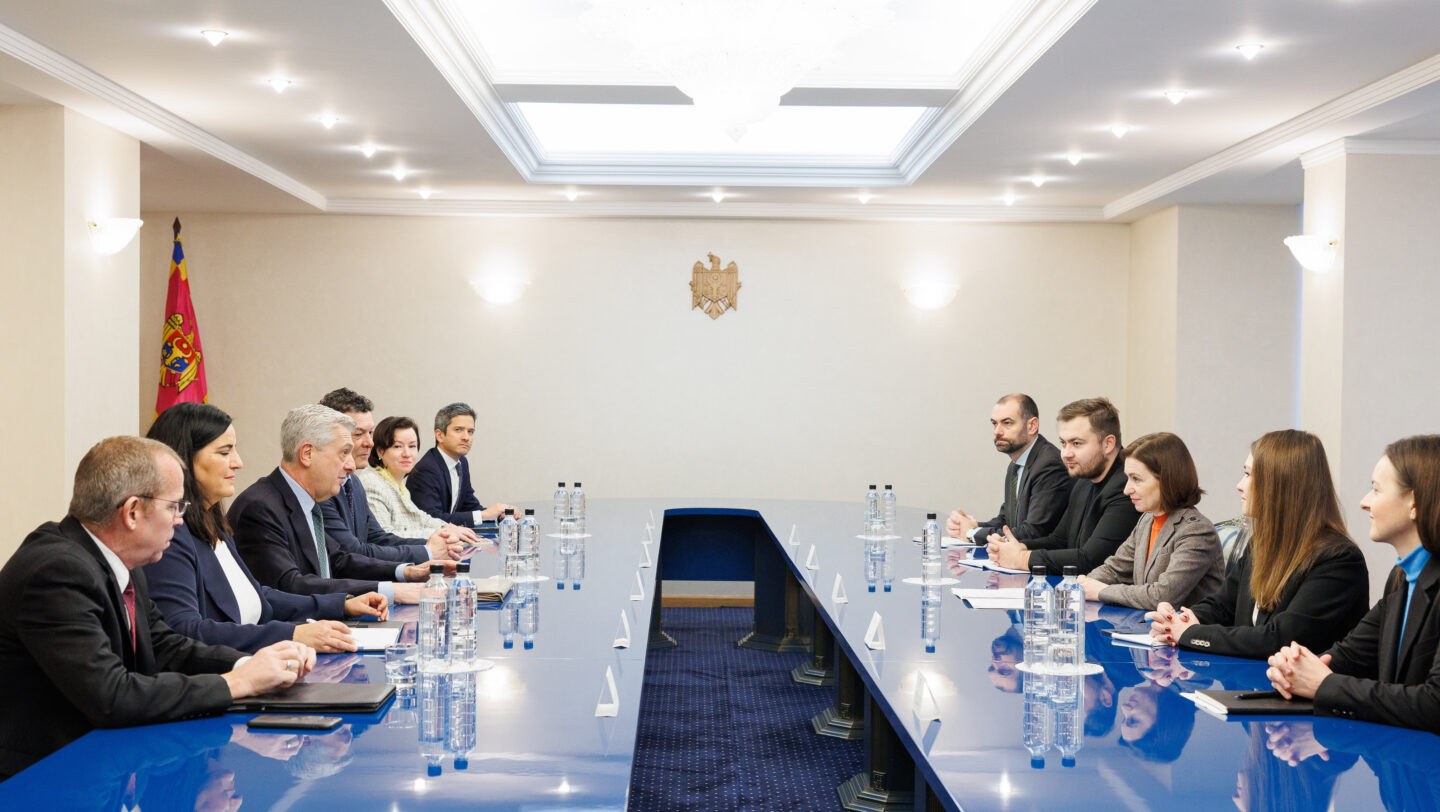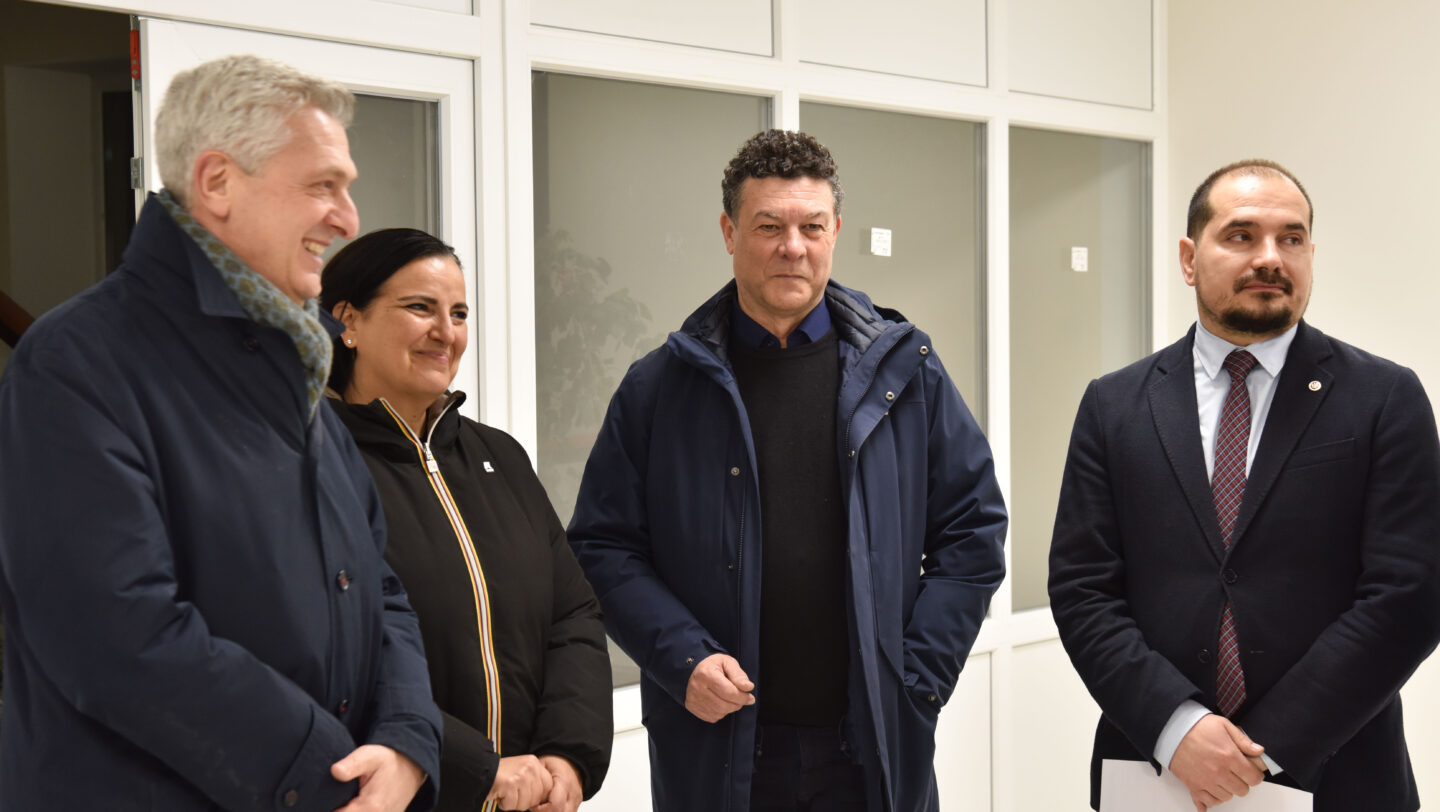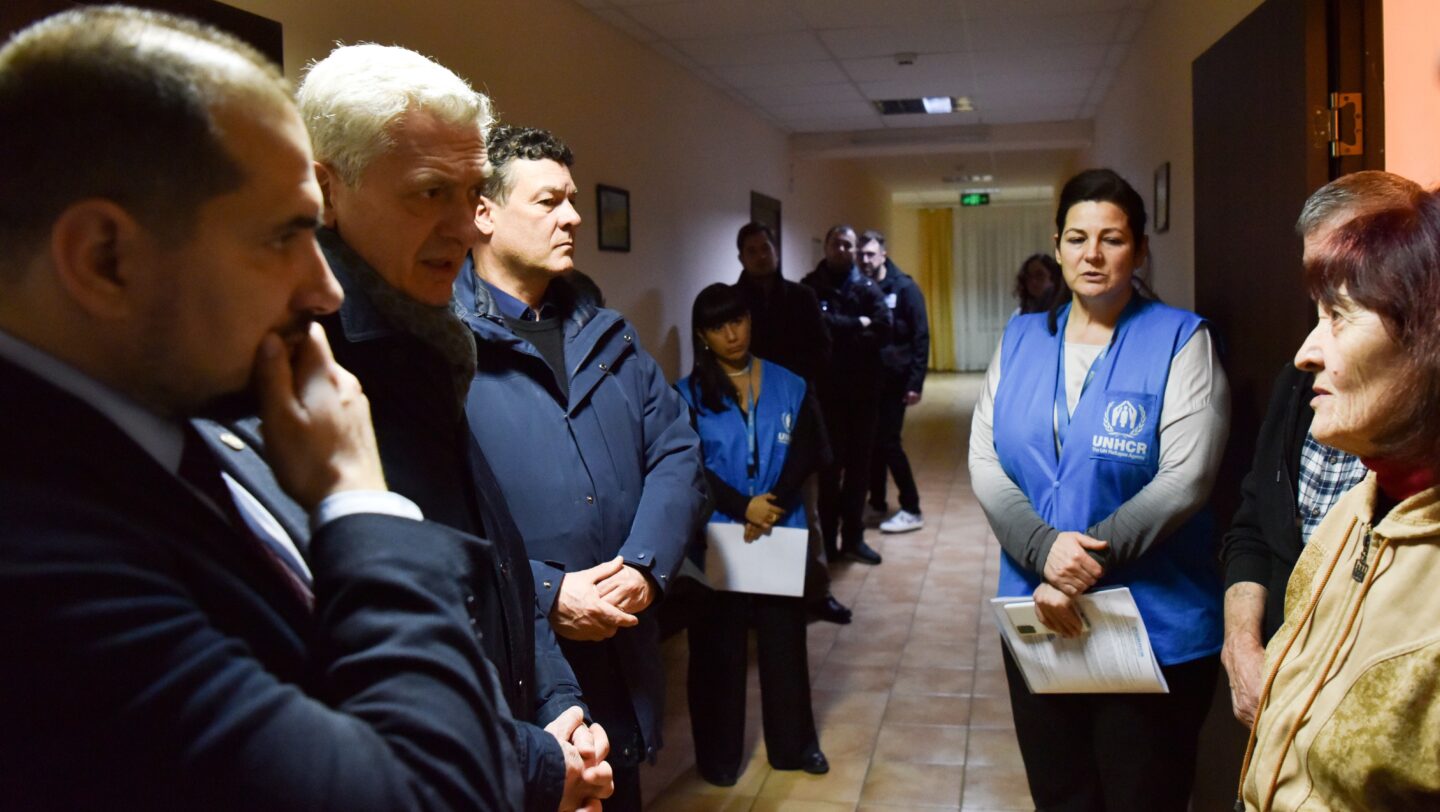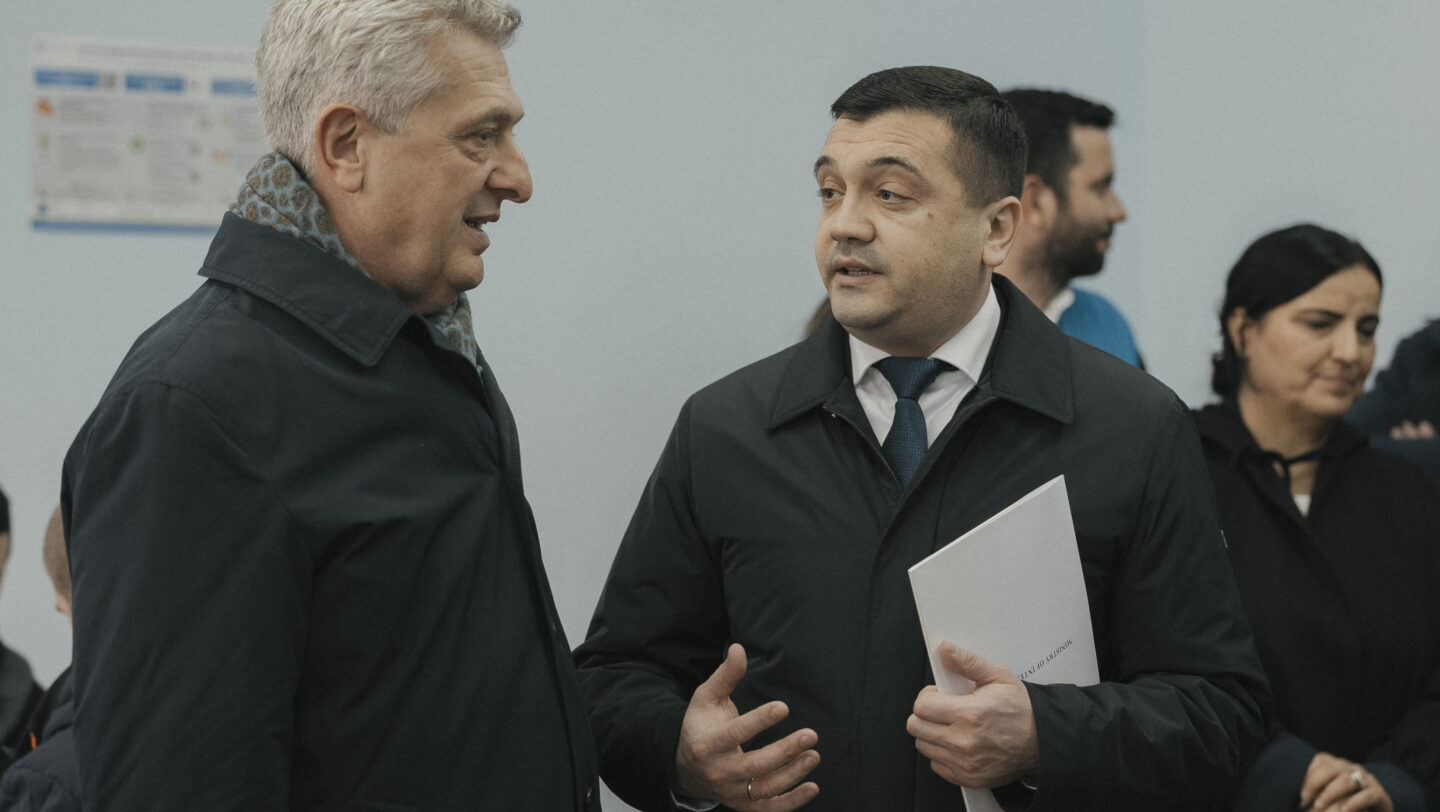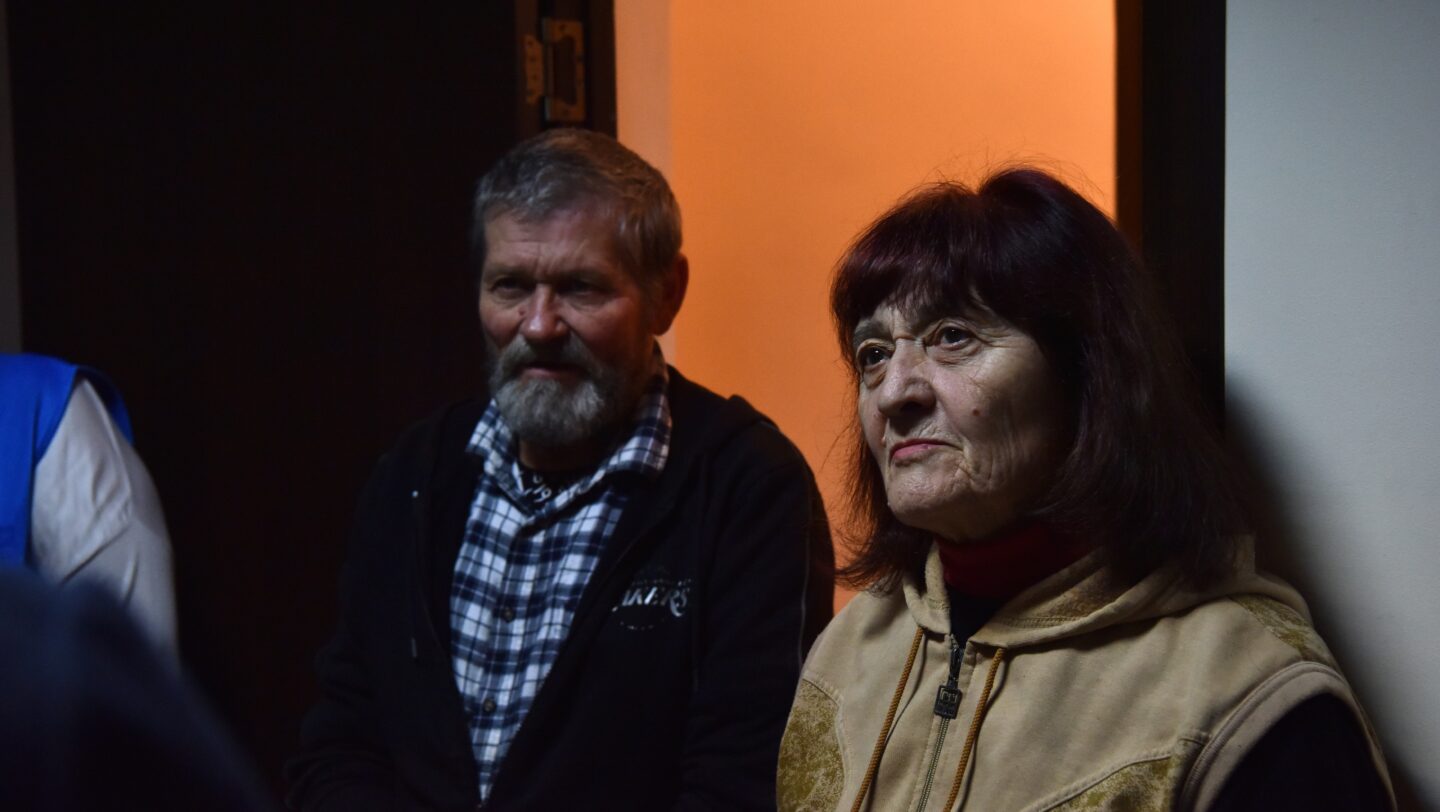Moldovan Soprano Valentina Nafornița, UNHCR High Profile Supporter, Advocates for Refugees in Strasbourg
Strasbourg, June 21, 2023 – In honor of World Refugee Day, Moldovan soprano and UNHCR high-profile supporter Valentina Nafornița was invited by the Council of Europe to deliver a keynote address and a captivating performance. This event was part of the Council of Europe’s 75th anniversary celebrations and Refugee Week 2024, which included various events organized by the City of Strasbourg and the Association Foyer Notre-Dame.
Having become a high-profile UNHCR supporter last year, Nafornița emphasized the crucial role of solidarity in supporting refugees. “Solidarity is the cornerstone of our mission,” Nafornița declared. “When nations, communities, and individuals come together, we create a powerful force for good. Solidarity means standing with those in need, not just in words but in deeds. It means providing shelter, education, and economic opportunities for a better future. It means listening to the stories of those who have lost everything and giving them a hand to hold, a shoulder to lean on.”
World Refugee Day was commemorated in Strasbourg as part of the Council of Europe’s 75th anniversary celebrations. Nafornița’s participation highlighted the importance of compassion towards refugees and solidarity with the Ukrainian people.
On June 20, UNHCR Representatives to the European Institutions in Strasbourg organized a concert featuring Valentina Nafornița, in addition to a lecture by musicologist Camille Lienhard. The musical recital, themed around “Exile,” included performances by internationally renowned artists: Franco-Romanian soprano Andreea Soare, French mezzo-soprano Anaïs Yvoz, and French pianist Vérène Rimlinger.
For her performance, Nafornița chose a piece by Romanian composer George Enescu, bringing emotional depth to the event and underscoring the universal themes of displacement and hope.
As the first public figure in the Republic of Moldova to receive the title of UNHCR high-profile supporter, Nafornița is dedicated to raising awareness about the plight of refugees and mobilizing humanitarian support. Her work with UNHCR aims to inspire and assist those in need, ensuring that their voices are heard and their stories are shared.
For more information about Valentina Nafornița’s work with UNHCR, please visit: Valentina Nafornița – UNHCR.
THANK YOU, MOLDOVA: WORLD REFUGEE DAY 2024
Chișinău, Moldova – June 20, 2024 – World Refugee Day 2024 was marked by an event celebrating the Republic of Moldova’s solidarity and support towards refugees. As the number of forcibly displaced people reached unprecedented levels due to global conflicts, political instability, and economic challenges, – 120 million globally – Moldova’s commitment to welcoming refugees stood out as a beacon of hope and compassion.
The event, themed “Thank You, Moldova,” took place at Digital Park in Chișinău. It highlighted good practices, and experiences from various actors involved in the refugee response. Importantly, it honored the Moldovan people and the courage of refugees who have found safety and community in Moldova. Bringing together government structures, non-governmental organizations, international and national organisations, private sector, ambassadors, media representatives, refugees, and individuals interested in refugee issues, the event fostered a dialogue on refugee support.
The event featured three panel discussions. The first panel, “Beyond borders: the first days,” reflected on the initial months of the refugee response, focusing on how access to territory and essential services was ensured. The second panel, “Unlocking potential: commitment to inclusion,” addressed the inclusion of refugees in schools, workplaces, healthcare systems, and communities. The third panel, “From strangers to neighbors: strengthening social cohesion,” shared community experiences, highlighting the inclusion process and its impact on daily life.
Yulia Zenchenko, Head of Female Support Force and representative of the refugee community, expressed heartfelt gratitude: “This awful war made me leave my home, but it also introduced me to Moldova and its people. What we found here gave us hope and made us feel warm and welcome. On behalf of the refugee community, I want to say that we are opening our hearts to you as well.”
Alexei Buzu, Minister of Labour and Social Protection, shared: “During a recent visit to Kyiv, I spent nights in bomb shelters due to air raids. I couldn’t stop thinking about my colleagues in Ukraine working under such conditions, worrying about their families. This reinforced my belief that we must cherish our peace and remember that it is thanks to Ukraine. We can reciprocate by working for refugees, integrating them into our society, and ensuring they feel welcome.”
The event also honored outstanding journalistic coverage of refugee issues, emphasizing the importance media in raising awareness about social issues. Out of 29 submissions, three finalists were recognized: Tatiana Beghiu from Moldova.org for “Bohodara wants to go home,” Alina Mikhalkina from Newsmaker.md for “Running away from guns. How men who don’t want to fight get from Ukraine to Moldova,” and Eugenia Apostu from Radio Free Europe Moldova for “Ukrainian para powerlifting champion, refugee in Chișinău.”
“Moldova has set an exemplary standard of solidarity with refugees. On World Refugee Day, we recognize the hospitality shown by the Moldovan people and the solidarity that allows refugees to live with dignity” commented Bertrand Blanc, UNHCR Representative a.i. in the Republic of Moldova.
The event celebrated Moldova’s remarkable support for refugees and the resilience of the refugee community. Together, we envision a world where refugees are not only welcomed but are fully included in all aspects of life.
For inquiries, please contact:
Monica Vazquez
[email protected]
External Relations Officer, UNHCR
Chișinău, Republica Moldova
UNHCR warns against apathy and inaction amid spike in forced displacement
GENEVA – Forced displacement surged to historic new levels across the globe last year and this, according to the 2024 flagship Global Trends Report from UNHCR, the UN Refugee Agency.
The rise in overall forced displacement – to 120 million by May 2024 – was the 12th consecutive annual increase and reflects both new and mutating conflicts and a failure to resolve long-standing crises. The figure would make the global displaced population equivalent to the 12th largest country in the world, around the size of Japan’s.
A key factor driving the figures higher has been the devastating conflict in Sudan: at the end of 2023, 10.8 million Sudanese remained uprooted. In the Democratic Republic of the Congo and Myanmar, millions were internally displaced last year by vicious fighting. UNRWA estimates that by the end of last year, up to 1.7 million people (75 per cent of the population) had been displaced in the Gaza Strip by the catastrophic violence, most of whom were Palestine refugees. Syria remains the world’s largest displacement crisis, with 13.8 million forcibly displaced in and outside the country.
“Behind these stark and rising numbers lie countless human tragedies. That suffering must galvanize the international community to act urgently to tackle the root causes of forced displacement,” said Filippo Grandi, the UN High Commissioner for Refugees. “It is high time for warring parties to respect the basic laws of war and international law. The fact is that without better cooperation and concerted efforts to address conflict, human rights violations and the climate crisis, displacement figures will keep rising, bringing fresh misery and costly humanitarian responses.”
The largest increase in displacement figures came from people fleeing conflict who remain in their own country, rising to 68.3 million people according to the Internal Displacement Monitoring Centre – up almost 50 per cent over five years.
The number of refugees, and others in need of international protection, climbed to 43.4 million when including those under UNHCR and UNRWA’s mandates. The vast majority of refugees are hosted in countries neighbouring their own, with 75 per cent residing in low- and middle-income countries that together produce less than 20 per cent of the world’s income.
The report showed that worldwide, more than 5 million internally displaced people and 1 million refugees returned home in 2023. These figures show some progress towards longer-term solutions. Positively, resettlement arrivals increased to almost 160,000 in 2023.
“Refugees – and the communities hosting them – need solidarity and a helping hand. They can and do contribute to societies when they are included,” Grandi added. “Equally, last year millions of people returned home, representing an important glimmer of hope. Solutions are out there – we’ve seen countries like Kenya lead the way in refugee inclusion – but it takes real commitment.”
The report also offered new analysis on the climate crisis and how it increasingly and disproportionately affects forcibly displaced people.
Given the immense challenges facing 120 million forcibly displaced people outlined in the Global Trends report, UNHCR remains steadfast in its commitment to delivering new approaches and solutions to help people forced to flee their homes, wherever they are.
Otaci becomes a City of Solidarity: Municipality and UNHCR sign Memorandum of Cooperation
Otaci, 29 May 2024 – The Municipality of Otaci has signed a Memorandum of Cooperation (MoC) with UNHCR, the UN Refugee Agency in the Republic of Moldova, under the framework of “Cities of Solidarity”. This initiative aims to enhance support and integration for refugees, asylum seekers, and stateless persons within the local community. The occasion also marked the inauguration of Otaci’s first playground and a new sports facility, demonstrating the collaborative efforts of the Municipality of Otaci, UNHCR, and local organizations in their commitment to inclusivity and support for all residents.
“Everyone is welcome here. This Memorandum of Cooperation is critical to us. UNHCR has identified these cities of solidarity, and I’m proud Otaci is part of this network. We understand the responsibility it comes with it. Signing this agreement highlights our long-standing collaboration in providing assistance and building community, but it also marks a new chapter in our relationship” declared the mayor of Otaci, Dmitrii Zavrotchii.
The local authorities and community members of Otaci were among the first to respond to the refugee influx in the area. The Roma-led NGO Bahtalo Ker alongside the mayor’s office, established a volunteer center to support people crossing the border, providing them food, hot drinks, WASH (water, sanitation, and hygiene) facilities, warmth and free transportation services. 6% of Otaci’s population are refugees (approximately 450 refugees currently reside in the city), with increased support from UNHCR and its partners, until today Bahtalo Ker and the mayor’s office continue their efforts to assist refugees living in the community.
“The collaboration between local authorities and Bahtalo Ker exemplifies the kind of proactive and inclusive approach that makes a tangible difference in the lives of displaced individuals, fostering a sense of belonging and mutual support. Their contributions have, in fact, been instrumental in not only providing essential services like shelter, food, and hygiene facilities to refugees but also in creating a warm and welcoming environment for everyone” expressed UNHCR’s Representative a.i. in the Republic of Moldova, Betrand Blanc.
Otaci is the second city in Moldova to join the network of Cities of Solidarity. Jointly with local and regional authorities, UNHCR is advocating for the protection and inclusion of refugees, asylum seekers, stateless persons, and host community members in urban and suburban areas. The initiative Cities of Solidarity in the Republic of Moldova has three key objectives: to enhance inclusion by improving access to essential rights and services, to build local capacity by providing authorities and civil society with the necessary tools to benefit both displaced populations and host communities, and to spark innovation by fostering creative solutions and best practices that can be replicated elsewhere.
The Cities of Solidarity initiative has been successfully piloted in several other locations globally, such as Argentina, Chile and Mexico. Because of Moldova’s effective and commendable response to the Ukrainian refugee crisis, UNHCR decided to implement the initiative in the country to showcase good practices and support the adaptation of urban areas to refugee influx.
For media inquiries
Monica Vazquez
+373 609 44 339
Music, Discussions, and Art: Moldova Holds “Amare Amala” Roma Culture Week
The Republic of Moldova will host theatre performances, discussions and vibrant cultural presentations as part of “Amare Amala: Roma Culture Week” from 8-13 April, which will end with a Roma music concert on Saturday. This series of events is dedicated to International Roma Day, marked annually on 8 April. The events aim to raise awareness of Roma culture and combat stereotypes and discrimination against this ethnic minority.
In the 2014 census of the population of the Republic of Moldova, 9,383 people declared themselves to be Roma. However, more recent estimates suggest that there are more than 27,000 Roma in the country, a number that is even higher after hundreds of Roma from Ukraine fled the war and sought refuge in the country. Yet Roma continues to face discrimination and misunderstanding, often dictated by a lack of knowledge of their rich traditions and culture.
At the initiative of the Roma Task Force, starting in 2023 has been organised, “Amare Amala: Roma Culture Week”, a series of events dedicated to 8 April. Last year, the week of events organised at the national level saw the participation of more than 1500 people, and the organisers aim to increase this number for this edition, thus contributing to raising awareness of Roma traditions, culture and history, and combating discrimination against this community.
Marin Alla, director of the “Roma Voice” Coalition – a coalition of 38 Roma organizations, says: “The Roma community in Moldova is not a burden. The country that has Roma is a rich, free, and independent country. The Roma community in Moldova love the land they were born in and cannot sell it.”
The events organized throughout the Roma week offer the opportunity for everyone to discover the uniqueness of these people through the universal language of the arts. Marco Buono, Head of Mission of INTERSOS Moldova, one of the main organizers of the “Amare Amala” events, declared: “At INTERSOS, we believe that recognizing and celebrating International Roma Day empowers Romani individuals and communities by affirming their identity, dignity, and rights. Through organizing this musical event dedicated to Roma culture, we aim to renew our commitment to promoting the rights and well-being of Romani people and to contribute to raising awareness among the general public about the challenges and discrimination faced by Romani communities.”
This year’s Amare Amala Week includes for the first time nationwide educational activities in gymnasiums, high schools and universities. This is possible thanks to the collaboration with the Ministry of Education and Research of the Republic of Moldova. “In the week dedicated to Roma culture, we express our gratitude to this community and pay tribute to their contribution to the development of our society. We are committed to working together to promote Roma rights, culture and education, thus building a more inclusive future for all members of this community.”, said the Minister Dan Perciun, Educational institutions will take the initiative to organize these activities, with support from national and international organizations, aimed at increasing acceptance and inclusion of Roma children.
The series of events also includes a two-day regional conference organized by the UNHCR, the UN Refugee Agency, to promote the inclusion of Roma people in the refugee response in Moldova and to share good practices from other countries hosting Ukrainian refugees. This is the first regional event dedicated to discussing Roma inclusion, and it will bring together representatives and Roma mediators from five European countries. Francesca Bonelli, Representative of UNHCR Moldova, said: “Embracing diversity means recognising the beauty of our differences and the strength in our unity. The Roma Culture Week is therefore an excellent opportunity for us not only to honour diversity but also to cultivate a society where every individual can thrive. Following the principle of leaving no one behind, UNHCR supports and empowers Roma refugees and their communities by ensuring their access to services and fostering social cohesion.“
“Amare Amala: Roma Culture Week” this year will conclude with a concert at the “Mihai Eminescu” National Theatre, performed by the Moldovan National Youth Orchestra,on 13 April. More than 30 young musicians will perform under the baton of Andriano Marian, the famous conductor from the Republic of Moldova, who is also of Roma ethnicity, featuring symphonic versions of Roma culture songs from Moldova, Romania, Hungary, Spain and Portugal. Joining the orchestra will be soloists Ana Raiu, Aurel Chirtoaca, Felicia Dunaf and Misha Grossu, Mihai Duminică and Ionuț Ciocanu.
The concert will be preceded by an activity fair for children and adults from 1:00 pm to 5.30 pm, where visitors will be able to participate in interactive games, face painting, drawing, quiz games and more. More details can be found here: https://www.facebook.com/events/394735336811153
The Roma week events are free of charge, thanks to the generous support of the Italian Agency for Cooperation and Development, the European Union, the Norwegian Ministry of Foreign Affairs, UNHCR, the Norwegian Refugee Council and the International Organization for Migration.
Jacopo Caridi, NRC Country Director, said: “It is an honour for the Norwegian Refugee Council (NRC) to participate for the second consecutive year in the celebration of International Roma Week in Moldova. Around the world, NRC prioritizes assisting conflict-displaced and vulnerable communities, such as the Roma in Moldova. In partnership with the local NGO ROMNI, we helped conflict-displaced people from the Roma community, ensuring access to legal information and participation in protection activities to promote their culture, enhance integration, and avoid discrimination.”
Lars Johan Lönnback, IOM Moldova’s Chief of Mission, has declared: ”IOM stands in solidarity with Roma communities, supporting their right to equality and full participation in all aspects of society. The Rome Culture Week is an important initiative that reminds us how crucial respect for diversity, the fight against all forms of discrimination, including hate speech, and common work for a just development of the country. Since 2022, IOM in the Republic of Moldova, thanks to the support of the donor community, has provided substantial assistance to Roma refugees displaced from Ukraine to prevent human trafficking and combat gender-based violence.”
All events planned for 8-13 April can be found in the joint events calendar created by the organizers.
The Ministry of Internal Affairs of the Republic of Moldova and UNHCR strengthen cooperation on supporting refugees and host communities affected by the conflict in Ukraine
Chisinau, 10 April 2024. Minister of Interior Adrian Efros met with the UNHCR, the UN Refugee Agency representative in the Republic of Moldova, Francesca Bonelli, to sign a Memorandum of Understanding to continue the collaboration between the two institutions.
During the encounter, the officials discussed the current situation of refugees in the Republic of Moldova, with a focus on the measures needed to ensure their appropriate protection and assistance. The discussions centered around ensuring these individuals receive the necessary services, underscoring the vital role of international cooperation and collaboration with other countries and organizations.
Furthermore, the need to improve legal and policy frameworks for the protection of refugees and to promote sustainable solutions for their integration into local communities was also addressed.
The Memorandum sets the stage for a comprehensive partnership, covering areas such as refugee assistance and protection, information management, emergency preparedness, and response coordination, alongside institutional capacity building.
Key priorities include devising medium and long-term assistance programs to seamlessly integrate displaced persons from Ukraine into local communities, facilitating voluntary repatriation programs with the assistance of UNHCR and IOM, and bolstering infrastructure and capacities for refugee reception and protection.
“UNHCR’s collaboration with the Ministry of Internal Affairs is key to keep providing support to refugees and the Moldovans who warmly host them, to integrate them into the society, and we hope to equip them with all means necessary to make this possible”, said Francesca Bonelli.
“The signing of this memorandum marks an important step in strengthening the partnership between our institutions and in supporting those affected by the conflict in Ukraine”, stressed Minister Adrian Efros.
The Ministry of Internal Affairs and UNHCR have shown their openness to continue working together to address the urgent needs of refugees and to promote their social and economic inclusion in Moldova.
A series of films about the experience of forced displacement and the lives of refugees was presented at the first Short Film Festival in Moldova
Nearly 40 filmmakers from the Republic of Moldova participated in the first short film festival in our country. Four of their creations, selected by the festival’s jury, were awarded professional Sony cameras.
Launched in October 2023 by UNHCR, the UN Refugee Agency, the Association of Creative Companies of Moldova (COR) and USM’s Centre for Production and Technologies for Film, Gaming and New Media Industries, Mediacor, “One Minute Festival: On the Move” compiled theory with practice. For 2 weeks, all those who wanted to create a short film could sign up for courses and masterclasses with experts from the film and storytelling industry. In total, the filmmaking workshops brought together over 300 participants.
Festival topics focused on forced displacement, refugee stories, hope away from home in the social-political context of recent years. After the theoretical part, participants had a few months to create their films and register them for the competition.
On 5 April 2024, the closing event took place at Mediacor, where 49 short films were presented and the award ceremony for the four best short films according to the jury took place:
1st place: Ceban Dmitrii, “Interdiction”
2nd place: Nicolae Butuc, “Separation”
3rd place: Rotaru Liviu, “There will be everything”
With global forced displacement at a record high of over 108.4 million people, promoting inclusion and empathy is crucial and the creative industry has a key role to play as it can be a major driver of change. The One Minute: On the Move Festival has succeeded in giving voice to displaced people and refugee stories and creating a platform to facilitate the expression and exchange of ideas.
Read more:
About the festival: https://www.1minfilms.md/
About UNHCR Moldova: https://www.unhcr.org/md/
About Mediacor: https://www.mediacor.md/
About COR: http://cor.md/
For questions, please contact:
Monica Vazquez
UNHCR External Relations Officer
Chisinau, Republic of Moldova
Moldova’s Refugee Response Plan for 2024: international solidarity and joint achievements
Chișinău, 15 February 2024. UNHCR, the UN Refugee Agency, in collaboration with the Republic of Moldova government, launched the 2024 Regional Refugee Response Plan (RRP), aiming to assist 90,000 refugees and 35,500 vulnerable Moldovans with USD 303 million. Amid the ongoing full-scale war in Ukraine, where hundreds of thousands sought refuge in Moldova since February 24, 2022, continued support remains essential.
In a display of international cooperation and solidarity, authorities at all levels, the United Nations (UN), international and national non-governmental organizations (INGOs and NGOs), the private sector, academia and local civil society have partnered under the Refugee Response Plan for the Ukraine situation since February 2022. The document guides the humanitarian efforts, states the needs, and the financial support required. Moldova’s refugee response, now entering its third year, stands out as a role model, thanks to the effective and humane leadership of the government of the Republic of Moldova, the solidarity of Moldovans, and continuous international support.
“Thanks to the Government of the Republic of Moldova, the UN, humanitarian partners, and the people who collaborated and contributed to the elaboration of the Refugee Response Plan for the year 2024. This plan is the basis of our joint work in the country and is the only document in the region that targets refugees and locals alike. With the war in Ukraine still decimating lives and displacing people, coordinating efforts is essential to ensure assistance reaches those who need it most “, said Francesca Bonelli, UNHCR Moldova representative.
As we enter the third year of the Refugee Response in Moldova, recognizing joint achievements is crucial. In 2023, we reached with assistance nearly 160,000 individuals, including 51,000 vulnerable Moldovans. In 2023, 46,000 hosting family members, alongside over 86,000 refugees received cash assistance, injecting over 123,000,000 USD into the Moldovan economy.
“The United States continues to be impressed by the nationwide response to the refugee situation and Moldova’s true hospitality. The United States has provided nearly $118 million to support refugees in Moldova – and their host communities – since the start of Russia’s full-scale invasion of Ukraine “, declared Kent Logsdon, United Stated Ambassador in the Republic of Moldova.
Another key achievement was the activating of Temporary Protection for the Ukrainian refugees. RRP partners worked closely with the government for a successful implementation, resulting in almost 30,000 refugees with TP status.
“Amid uncertainty, Moldova remains committed to defending human rights and democracy. We are confident that this year’s Refugee Response Plan will be guided by high-level collaboration and working shoulder to shoulder to achieve better results than last year”, stated Alexei Buzu, the Minister of Labor and Social Protection.
Close collaboration with national and local civil society organizations led to a surge in their participation in the 2024 RRP, from two Moldovan NGOs in 2022 to 46 out of 82 total partners.
The 2024 Refugee Response Plan focuses on key priorities. It aims to continue assisting individuals in obtaining legal status, particularly Temporary Protection prioritizes providing life-saving support for vulnerable individuals and enhancing their socio-economic inclusion, addressing barriers in accessing jobs, education, and healthcare. Additionally, it aims to promote social cohesion between refugees and host communities, preserving a welcoming and supportive environment. The plan also includes support for government authorities at all levels to enhance emergency preparedness, building resilience against future shocks caused by forced displacement.
As Moldova transitions from the emergency phase to an inclusion approach, the 2024 RRP emphasizes the need for continued international solidarity and close coordination to ensure a smooth evolution from the emergency to a sustainable inclusion, that builds a stronger Moldova for all.
Relevant links:
- Regional Response Plan 2024 for the Ukraine situation.
- Moldova: Refugee Coordination Forum – 2024 Moldova RRP Objectives, Activities and Indicators (01 Jan 2024)
- Refugee Response Plan 2024 – Moldova – Annex on Nexus
For media inquiries, please contact:
Monica Vazquez
[email protected]
External Relations Officer, UNHCR
Chisinau, The Republic of Moldova
UN High Commissioner for Refugees, Filippo Grandi, commends the Republic of Moldova’s commitment to safeguarding refugees and urges increased support for both refugees and the communities hosting them
(Chisinau, 19 January 2024): During his two-day visit to the Republic of Moldova, the United Nations High Commissioner for Refugees, Filippo Grandi, commended the commitment of the government of the Republic of Moldova and its people in protecting and assisting refugees from Ukraine seeking safety in the country. This acknowledgement took place during a meeting with the President of the Republic of Moldova, Maia Sandu. The UN High Commissioner for Refugees conducted his third official visit to the country on the 18th and 19th of January.
The President of the Republic of Moldova, Maia Sandu, expressed her gratitude for the support provided by UNHCR in managing the humanitarian crisis following the onset of Russia’s war of aggression against Ukraine.
The President mentioned that despite limited resources, the Republic of Moldova has firmly demonstrated solidarity with Ukrainian citizens seeking refuge in the country. As the war in the neighbouring country persists, the head of state reiterated the commitment to providing temporary protection for refugees in accordance with European standards.
“For nearly two years, the government and people of Moldova have shown remarkable courage, determination, and warmth in welcoming, protecting, and assisting refugees from Ukraine. They are an example to the world. Despite the strong global support received, the current situation demands an even greater level of solidarity from the international community, matching Moldova’s unwavering commitment. I appeal for much more support – humanitarian, development and bilateral – for refugees of course, but equally for Moldova and Moldovans.” Expressed Filippo Grandi.
The Republic of Moldova, both its people and government, have played a crucial role in providing a secure environment for those displaced by the war. Beyond warmly welcoming refugees, Moldova has taken significant legislative measures, granting temporary protection to Ukrainians and with-it ensuring access to services in the country.
Furthermore, Moldova actively engaged in the Global Refugee Forum, demonstrating its commitment by making nine pledges to support refugees. Its exemplary efforts have earned international recognition, showcasing Moldova as a positive example, even among larger nations. These commitments encompass a broad spectrum, emphasizing refugee inclusion, safeguarding child rights, promoting gender equality, mitigating the risk of gender-based violence, and ensuring the delivery of comprehensive services for refugee survivors.
Earlier this week UNHCR, the UN Refugee Agency, asked for continued international support for the Ukraine Situation Refugee Response Plan (RRP) to enable providing much-needed assistance for Refugees from Ukraine seeking safety in neighbouring countries including the Republic of Moldova.
During his visit, the High Commissioner Filippo Grandi, joined by UNHCR’s Regional Director for Europe, Philippe Leclerc, and UNHCR’s Representative to the Republic of Moldova, Francesca Bonelli; met with Moldova’s Minister of Labour and Social Protection, Alexei Buzu at Centrul de plasament pentru Persoane Vârstnice și Persoane cu Dizabilități. The High Commissioner also met with Minister of Internal Affairs Adrian Efros at UNHCR’s registration centre. Partner organizations CRS and CDA provided updates on operations, including UNHCR’s cash assistance program and legal support for refugees.
The High Commissioner also joined a discussion with the international community and the World Bank, and visited community initiatives and local infrastructures in Palanca. UNHCR has been actively partnering with local authorities hosting refugees to enhance services for both the refugee population and the host communities.
Note to editors
UNHCR in Moldova has been supporting government-led efforts to provide protection and support to refugees since establishing a presence in the country in 1997. UNHCR significantly expanded its operations in the country in late February 2022 in response to the arrival of refugees from Ukraine and joined the Government of Moldova in co-leading the interagency humanitarian response aligned with the Regional Refugee Response Plan (RRP) for the Ukraine Situation.
Key figures about the refugee response in the Republic of Moldova
- More than 126,000 refugees received cash assistance since 24 February 2022 (over USD 146M disbursed to refugees)
- Around 177,000 refugees have been supported with legal assistance since 24 February 2022
- Around 2,300 refugees are now hosted in 44 refugee accommodation centres supported by UNHCR, while others live in host communities.
- Ten Community Centers are operational in the country, providing safe spaces and activities for refugees and Moldovans alike. These centers are pivotal in facilitating community engagement and support, embodying a commitment to connectivity and empowerment.
Media contacts
In Moldova:
- Monica Vazquez, [email protected], +373 609 44 339


















